Courtesy: Big Hit Entertainment
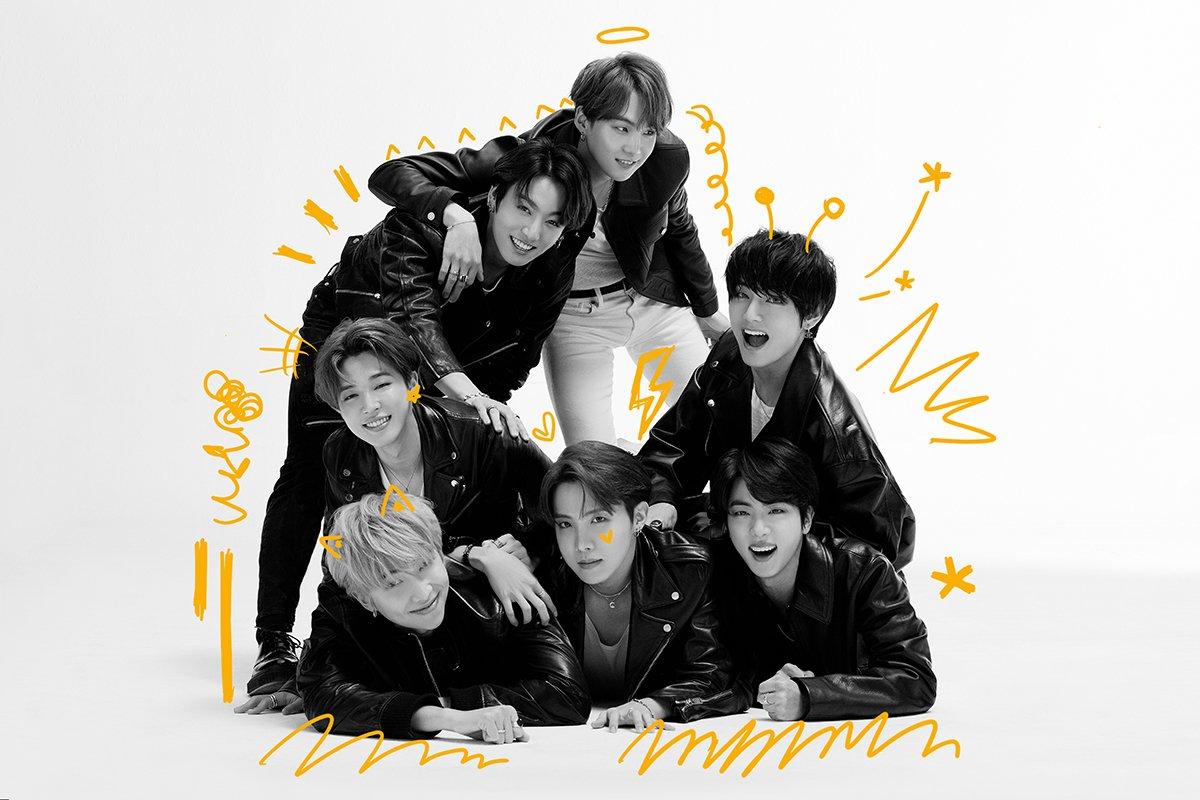
BTS
news
BTS Talk New Album 'Map Of The Soul: 7': "The Genre Is BTS"
The international pop stars discuss the creative process behind their latest release and shine a light on the growing creative community in South Korea
International pop stars BTS are used to shattering world records. They've done it time and time again.
In 2018, the septet became the first Korean group to receive gold status from the Recording Industry Association Of America (RIAA), for the Steve Aoki remix of their 2017 track, "Mic Drop," featuring rapper Desiigner. The song, now certified platinum, became the act's first hit in the U.S., setting off an ongoing streak of Stateside hits and world records for the South Korean boyband. That same year, they became the first Korean act to top the Billboard 200 chart with Love Yourself: Tear.
BTS are now back to dominate the charts once again with Map Of The Soul: 7. Released just yesterday (Feb. 21), the new album is already the best-selling album of the year worldwide. Another day, another world record in the life of BTS.
Map Of The Soul: 7, BTS' fourth studio full-length to date, is the next installment in the band's ongoing Map Of The Soul series. It picks up from the 2019 chart-topping Map Of The Soul: Persona EP. In addition to featuring songs from the latter, Map Of The Soul: 7 expands on some of the themes and topics from the overall series, including the concepts of persona, shadow and ego.
"[Map Of The Soul: 7 is a] continuation from the album before, called Persona," BTS member RM tells the Recording Academy. "And this time, we put the other two themes, shadow and ego, and we put it together into [this] album, called 7. The difference is [the] persona, which is like the social mask before the good things that we have, [like] the spotlight. This time [on 7] we talked about the real shades and shadows that we had inside, and also the big manifesto that we admitted: all the shadows as our destinies and we're gonna carry on."
Sonically, Map Of The Soul: 7 touches on many genres and sounds. Album opener "Intro: Persona" sees RM rapping over a guitar-laced, bossy hip-hop beat, while "Interlude: Shadow," a solo track from BTS member Suga, is an atmospheric pop ballad that converts into an industrial rap monster.
For the group, Map Of The Soul: 7 breaks free from genre confines once and for all.
"I think it's less and less meaningful to divide music into genres now," Suga says.
"The genre is BTS. That's the genre we want to make and the music that we want. New genre," the group's Jungkook, V and J-Hope add.
On the day of the album's release, the Recording Academy caught up with BTS—all seven members!—at the Park Hyatt New York in Midtown Manhattan to discuss the creative process behind and deeper meanings within Map Of The Soul: 7, the group's all-star collaborator wishlist and the growing creative footprint of their South Korean homeland.
This interview was edited for clarity and brevity. An interpreter translated all answers from BTS, except for RM.
<style>.embed-container { position: relative; padding-bottom: 56.25%; height: 0; overflow: hidden; max-width: 100%; } .embed-container iframe, .embed-container object, .embed-container embed { position: absolute; top: 0; left: 0; width: 100%; height: 100%; }</style><div class='embed-container'><iframe src='https://www.youtube.com/embed//LmApDbvNCXg' frameborder='0' allowfullscreen></iframe></div>
Can you talk about the creative process behind Map Of The Soul: 7? How does it differ from the rest of your albums?
Suga: It took us a little longer, and this is our first full album in quite a while. But making an album isn't just making the music. We have the songs, there's the choreography and a lot of other elements that come with it, so it took some time. But once we got started, it really started rolling along and it was really fun.
The album features individual tracks that highlight traits from each of the seven BTS members. How does the album reflect each individual member? And how does it reflect BTS as a whole?
Jungkook: I think individually, it really contained what we wanted to put into the music and the ideas that we have, and this is what we put in.
RM: As a group, it's like a big statement or like a manifesto that we finally admitted our shadows and egos at the same time as part of our destiny. So it's like, you're going to carry on and you can bring the pain and we'll carry on.
Map Of The Soul: 7 reflects on the seven years since BTS debuted in 2013. What has been the biggest life and career lessons you've learned so far?
Jin: Thanks to these guys, I think I learned more about music. I didn't really know a lot about music when I started out, but now I've learned how to write music or make melodies. That's what I really got out of the past seven years, thanks to these guys.
Jungkook: I think I really learned how precious music is, how important it is to me. Recording the music for this album, working on the music—through this whole process, [it was] really fun and meaningful because, again, I kind of learned and figured out how precious music is and how important it is to me.
The new album features collaborations with Halsey and Sia. Who are some other artists you want to collaborate with?
All (shouting out loud): Ariana [Grande], Travis [Scott], Taylor [Swift], Beyoncé, Billie Eilish, Post Malone, "Big" Nas, Lil Nas X!
RM: Call our label, please.
Your music as BTS has touched on many genres, from rap to pop. Are there any other genres or sounds you're interested in exploring in the future?
Suga: I think it's less and less meaningful to divide music into genres now.
Jungkook, V, J-Hope: The genre is BTS. That's the genre we want to make and the music that we want. New genre.
Map Of The Soul: 7 is a continuation of Map Of The Soul: Persona. How are the two projects related? And how are they different?
RM: Like you said, [Map Of The Soul: 7 is a] continuation from the album before, called Persona. And this time, we put the other two themes, shadow and ego, and we put it together into [this] album, called 7. The difference is [the] persona, which is like the social mask before the good things that we have, [like] the spotlight. This time [on 7] we talked about the real shades and shadows that we had inside, and also the big manifesto that we admitted: all the shadows as our destinies and we're gonna carry on. We put all the three things [together] and made a series.
Watch: Lil Nas X, BTS & Billy Ray Cyrus Enter The "Old Town Road" Multiverse At The 2020 GRAMMYs
The K-pop genre has exploded across the world over the past few years. Where does K-pop go from here? What would you like to see happen for your community?
Suga: As you said, the stature of K-pop has really grown all over the world. But rather than be recognized as the rise of a genre or the rise of K-pop as a genre, I would like more talented Korean artists to be better known around the world, because I think there are a lot of talented Korean artists, and it's really amazing to have this small country and so many talented people coming out of it. That's what I'd like to see.
Speaking of talented Korean artists, how did you feel when Parasite won so many awards at the Oscars this year?
RM: We felt like we won the GRAMMYs. Parasite is a great movie; I also watched it in the cinema. And like Suga said, we just know that there are a lot of talented people in Korea, also including outside K-pop or K-movie or anywhere else. Parasite's honor is our honor, too. We're happy.

Photo: Tim Mosenfelder/WireImage
list
A Pirate Looks At Infinity: Jimmy Buffett's Legacy In 15 Songs
A year after his untimely passing, look back at the songs that point most convincingly back to Jimmy Buffett — the man, the artist and now, the never forgotten legend.
When Jimmy Buffett passed away on Sept. 1, 2023 at age 76, the decorated singer/songwriter, performer, author and entrepreneur left behind a legacy that unified a swath of musical genres and people.
The man behind "Margaritaville" — the song and later the brand — and so many other tunes that bridged folk sensibilities with country and rock touches, sometimes called "Gulf & Western," was much more than the beach-obsessed character he played in song. Although he had plenty of industry successes, notching 13 Billboard Hot 100 hits, a pair of GRAMMY Award nominations, while selling more than 20 million albums, his fans loved him for how he made them feel.
In song, he was a true storyteller that was clever, funny and introspective; in performances, he was the quintessential Parrothead to the core. As the ringleader of the party, he was generous enough to share the spotlight with members of his Coral Reefer Band as well as the fans who dressed up, tailgated outside the venues and spread their joy to others.
Both sides of Buffett were crucial building blocks in the business empire he built around his persona as the laid-back, casually philosophical beach bum. The Margaritaville restaurant and resort chains, his Landshark Lager beer and many other ventures made him a billionaire, while his storytelling prowess made him one of few authors to top both fiction and nonfiction bestsellers' lists. While his legacy may be both musical and merchandisable, the endearing qualities of the Parrothead personality he created is the real reward for his fans.
Below, remember Buffett's illustrious career through 15 classic songs — just a glimpse of his genius that made it okay for country singers to loosen up, for rockers to pick up an acoustic guitar, and for the Parrotheads to while away their days in the sun.
"Why Don't We Get Drunk," 'A White Sports Coat and a Pink Crustacean' (1973)
While Buffett's first two albums showed glimpses of the celebrated artist he would become, his songwriting largely hewed close to the earnest observations typical of early-seventies folkies. By his third album, though, he had grown into his winking style of satire and breezy, Nashville-meets-Key West flair.
This cut from A White Sports Coat and a Pink Crustacean combined both, and created the template for hundreds of bleary-eyed sing-alongs to follow. "The Great Filling Station Hold-Up" may have been the proper album single, but "Why Don't We Get Drunk," its controversial B-side, became the bigger tune — and the one featured on his seven-times Platinum compilation, Songs You Know By Heart.
"Come Monday," 'Living & Dying in ¾ Time' (1974)
As Buffett pulled away from his folk sensibilities, Nashville-style balladry became a big part of his sound. "Come Monday" brings orchestral strings into the mix to help express the yearnings he felt while stuck in "a brown L.A. haze," pining for his love back home. The song resonated with new fans, becoming his first Top 40 single, as it peaked at No. 30 on the Billboard Hot 100.
"A Pirate Looks at Forty," 'A1A' (1974)
It probably wasn't a stretch for Buffett to sing so convincingly from the perspective of a seafaring, modern-day pirate. He considered his own later entrepreneurial forays an adventure on the high seas of life. But back in '74, he was so inspired by the real-life stories of a Key West smuggler and rapscallion he befriended that he wrote "A Pirate Looks at Forty" from his perspective.
A key cut on his second long-player of '74, A1A, "Pirate" is empathetic to the dashed dreams and yearnings of a man looking back at his wins and losses. And despite the eventual billionaire fortunes of Buffett himself, his narrator determines the balance is a draw.
"Margaritaville," 'Changes in Latitude, Changes in Attitude' (1977)
Buffett's next album, Changes in Latitude, Changes in Attitude, launched his music career into the stratosphere — and its success had a lot to do with "Margaritaville," a Top 10 hit and the basis of the global brand he later built.
Essentially, "Margaritaville" established the beach-boho lifestyle as an aspiration for millions. Against a backdrop of tropical instruments like steel drum and marimba, Buffett sang of the quiet pleasures of an unhurried life, unconcerned with the tides and buoyed by his favorite blender drink. In 2016, the tune was voted into the GRAMMY Hall of Fame, while the Library of Congress added it to the National Recording Registry in April 2023.
"Son Of A Son Of A Sailor," 'Son Of A Son Of A Sailor' (1978)
Whether Buffett's soft and breezy music can be considered "yacht rock" is a subject of debate, but he certainly rocked a yacht or two in his day — and he dressed the part for the cover of his album Son Of A Son Of A Sailor. The title track is a definitive take on his love of the wandering life, untethered from the anchors many cling to and always in search of the next port of call. A master of ballads whimsical and wistful, Buffett manages to be both at once here.
"Cheeseburger in Paradise," 'Son Of A Son Of A Sailor' (1978)
Before it was a menu item at his Margaritaville-branded restaurants and resorts, "Cheeseburger in Paradise" was a mirage Buffett dreamed about while marooned at sea. As the story goes, a misadventure in the Caribbean left Buffett with only meager rations to survive. And when he finally struck a landing on dry ground, his first meal inspired one of his most enduring songs: an easy-rockin' Top 40 hit about cheeseburgers that somehow isn't a novelty cut — a hat trick only Buffett could pull off.
"Fins," 'Volcano' (1979)
As the lead tune from his 11th album, Volcano, "Fins" entered the pantheon of Buffett concert staples immediately and helped inspire plenty of Parrothead ephemera, as well as the title of the 1990 live album Feeding Frenzy and his Landshark Lager brand. But none of that would be important if not for Buffett's song about a hapless woman who travels to the beach to relax, but instead is encircled by "sharks that can swim on the land." With "fins" to the left and right of her, she's "the only bait in town."
"Boat Drinks," 'Volcano' (1979)
Buffett had a knack for coining phrases — and "Boat Drinks" certainly qualifies among the best. What makes a boat ride better? Boat drinks, of course.
An album cut from Volcano (also featured as a B-side to the single "Survive"), Buffett ironically wrote the song while on a winter sojourn in Boston, exiled from his native habitat and wishing the city's fresh blanket of snow were the sugar-white sands of Florida. Musically, the tune is a quintessential cut from his whirlwind late-seventies period, when Caribbean themes and sonic textures became his calling card.
"It's My Job," 'Coconut Telegraph' (1981)
Long before Mac McAnally joined Buffett as a sideman in the Coral Reefer Band, Buffett sent the young artist a note praising his songwriting. Then, for his 1981 album, Coconut Telegraph, Buffett boosted his new friend's fortunes by recording "It's My Job," a tune McAnally wrote about taking pride in your work — however menial or miserable it may be — while working on a hot Mississippi highway in the summertime. The tune reached No. 57 on the Billboard Hot 100, marking Buffett's last appearance on the chart until 2003 (more on that later).
"One Particular Harbor," 'One Particular Harbor' (1983)
The 1980s were the beginning of Buffett's transition from chart champion to blockbuster concert draw. But he still had plenty of gas in the songwriting tank, as songs like "One Particular Harbor" proved.
Inspired by his travels in Polynesia, Buffett sings in Tahitian about the "abundance of the sea" after leaving behind the mainland. While the song was a minor hit on Adult Contemporary radio, it became a fan favorite and a mainstay of live shows from the era.
"Jamaica Mistaica," 'Banana Wind' (1996)
Like on "Cheeseburger in Paradise," Buffett's penchant for seeing the humor in the unfortunate dustups of his real life shines on the Banana Wind cut "Jamaica Mistaica." In this case, Jamaican police opened fire on his plane, believing he was a smuggler or criminal straight out of his own song "A Pirate Looks at Forty." Set to a reggae beat, though, Buffett lets listeners in on the joke — an endearing quality that earned him the love not only of Parrotheads, but also an official apology from the Jamaican government.
"It's Five O'Clock Somewhere," Alan Jackson's 'Greatest Hits Volume II' (2003)
By the dawn of the new century, Buffett's beach-bum aesthetic had conquered Nashville, the town he left in the early '70s to find his identity as an artist in Key West. And "It's Five O'Clock Somewhere," recorded with country star Alan Jackson and featured on his Greatest Hits Volume II, was exactly the new Buffett-style anthem Music City needed.
It was also what Buffett's 21st century career needed: "It's Five O'Clock Somewhere" earned the veteran singer his first No. 1 on Billboard's Hot Country Songs chart as well as his first GRAMMY nomination (in the Best Country Collaboration With Vocals Category) and his first Country Music Association Award (for Vocal Event of the Year). Later, the song notched the No. 3 song of the decade on Billboard's Hot Country Songs chart, proving Buffett's staying power amid shifting musical trends.
"Bama Breeze," 'Take the Weather With You' (2006)
After Hurricane Katrina made matchsticks of Buffett's home territory in 2005 — the beachfront bars of Mississippi, Alabama and Florida where he cut his teeth — he responded with the album Take the Weather With You and its leadoff track, "Bama Breeze." The country-rock tune extols the virtues of the so-called "Redneck Riviera" and coming of age as the sun came up outside the dive bars of the Gulf Coast, many of which were now ruined. The song also nods to the fans who have stuck by him since the beginning: "At the Bama Breeze, you're one of our own down there/ You'll never drink alone down there/ Good god, I feel at home down there."
"Knee Deep," 'You Get What You Give' (Zac Brown Band, 2010)
One of the most rewarding markers of a mature career in music is the respect paid by each successive generation of musicians. Newly minted country star Zac Brown paid homage with "Knee Deep," which was written with Buffett in mind and borrows heavily from his long-established beachbound, escape-by-tropics aesthetic. But it truly takes off when Buffett himself takes the second verse and then harmonizes the choruses with Brown. And the combination proved sweet for both acts: the song was certified triple Platinum and landed at No. 1 on Billboard's Hot Country Songs and Country Airplay charts.
"Bubbles Up," 'Equal Strain On All Parts' (2023)
Although the public wasn't aware at the time, Buffett was dealing with the effects of Merkel cell carcinoma — the disease that claimed his life — throughout his final years of touring and recording music. Released two months after he passed, Equal Strain On All Parts, his 32nd and final album, arrived like a comforting voice from beyond to Parrotheads and casual fans alike.
On "Bubbles Up," Buffett was in a particularly reflective mood, facing his own mortality in his most measured, reassuring manner. The title phrase came from his survival training — if he were to find himself submerged in water, either from a boat or plane wreck, his trainers advised him to follow the bubbles up to the surface. "They will always point you toward home," he sings, "no matter how deep or how far you roam."
For a songwriter and performer who spent his life showing the world how to relax, enjoy life and see the humor in life's challenges, the reassuring sentiment — to quote the title of his 2004 album — underscores that a License to Chill has no expiration date.
Latest News & Exclusive Videos

Watch Ray Charles Win Album Of The Year In 2005
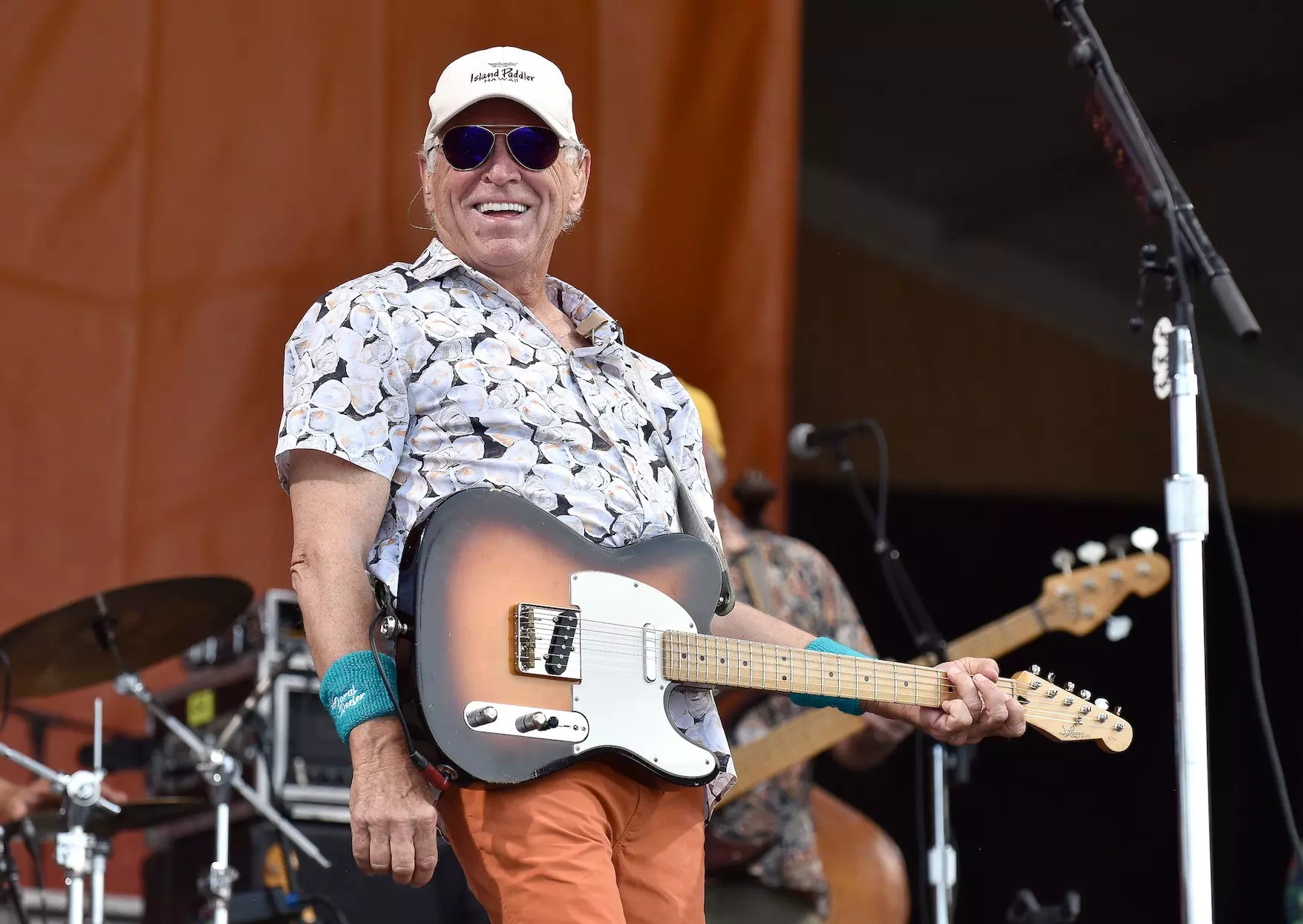
A Pirate Looks At Infinity: Jimmy Buffett's Legacy In 15 Songs
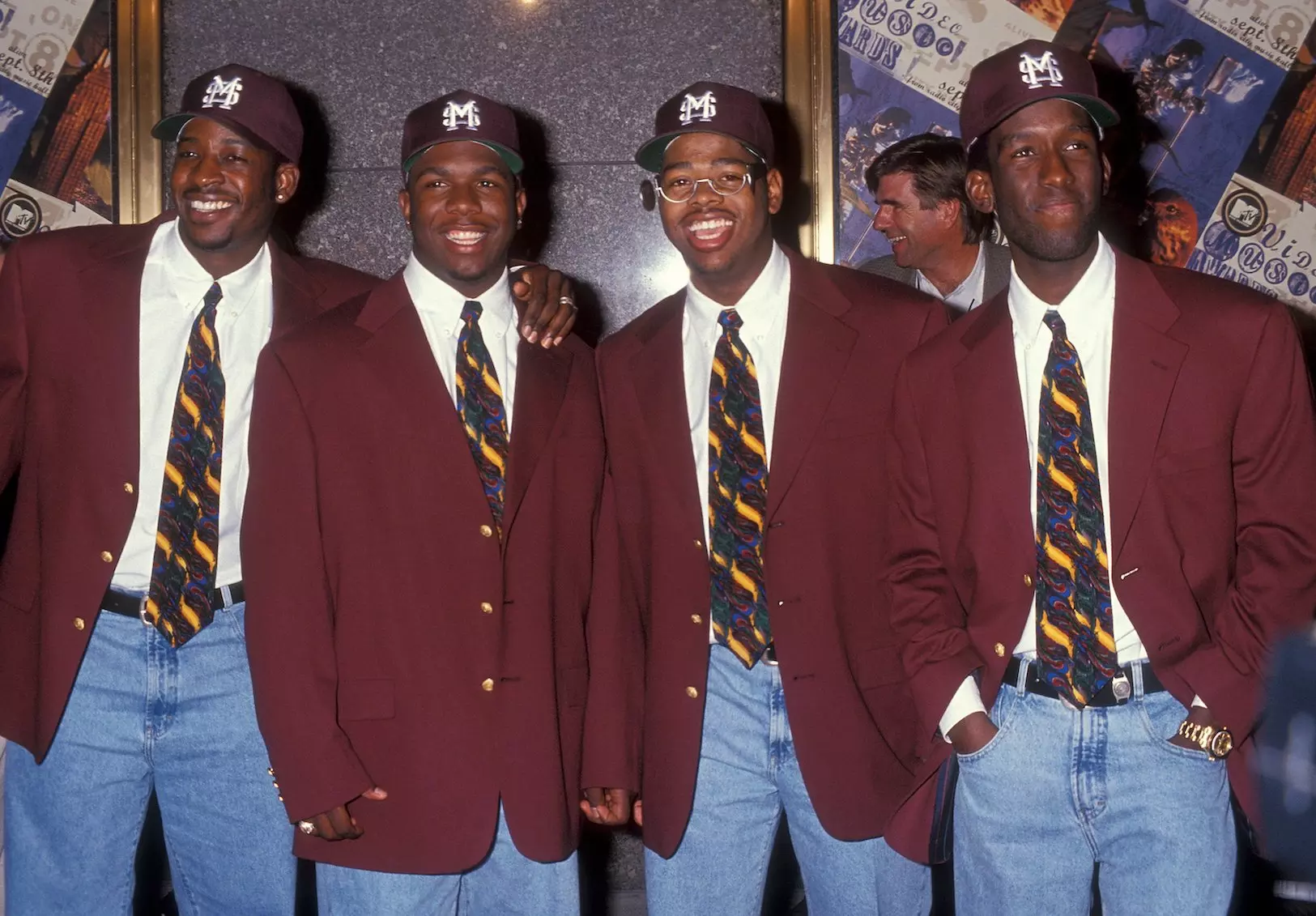
8 Reasons Why Boyz II Men's 'II' Was The '90s Ultimate R&B Blockbuster
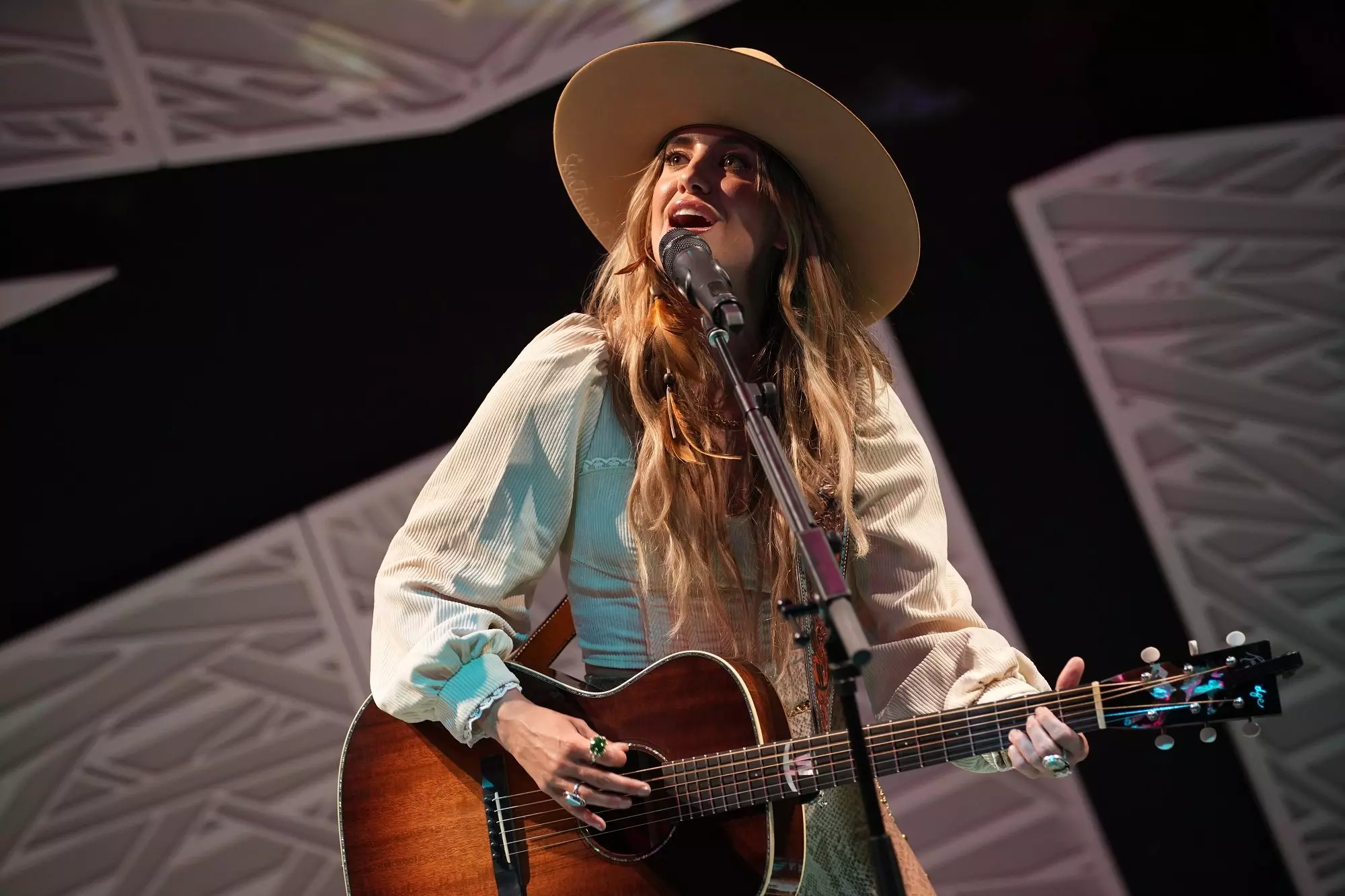
20 Live Events At The GRAMMY Museum This September: Experience Orville Peck, Kate Hudson, Tierra Whack & More

Watch Wunderhorse Perform "July"
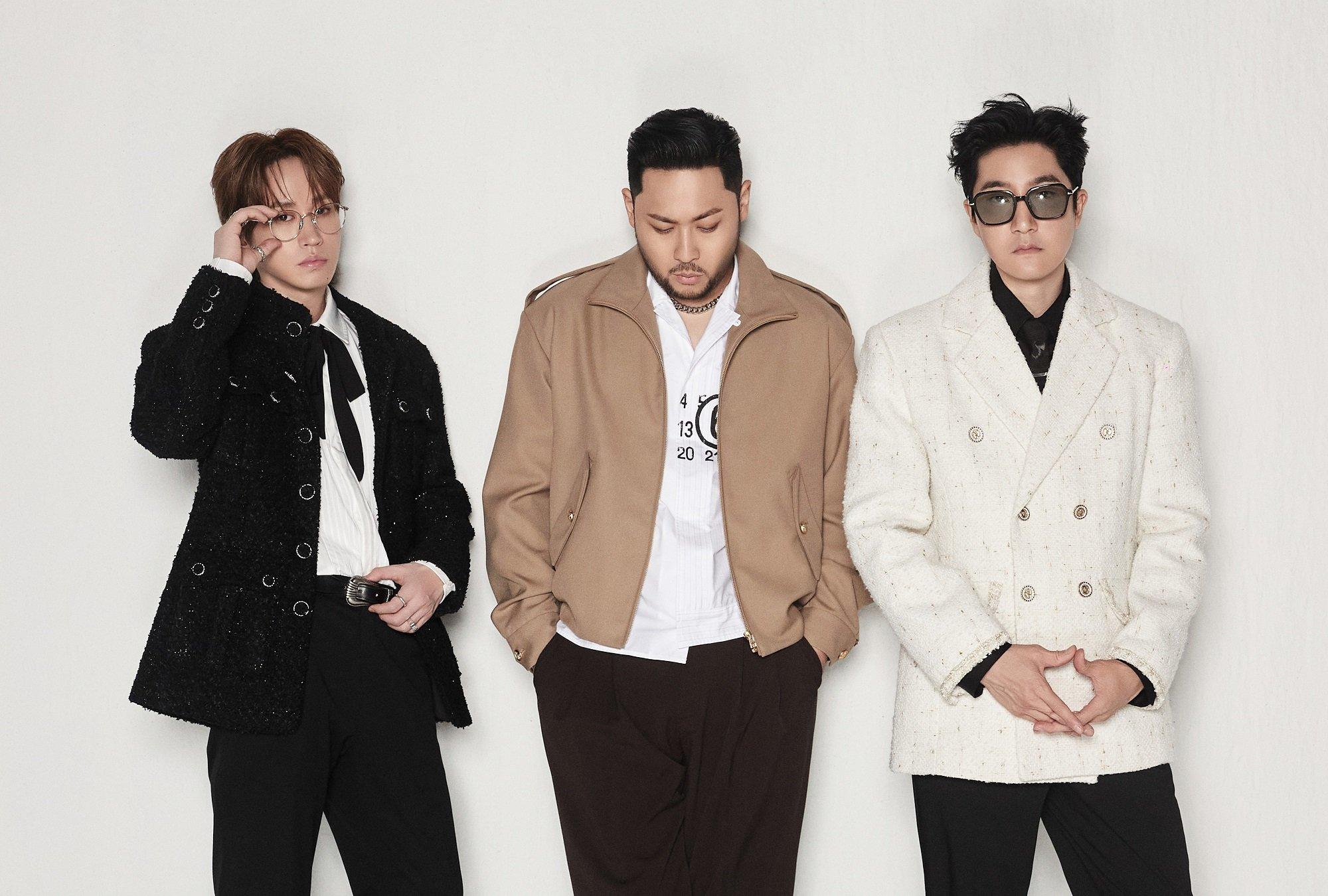
Photo: OURS Co.
interview
Epik High Are Still Pumped After All These Years: How The Korean Hip-Hop Trio Broke All Their Rules By Going Back To Basics
Epik High have released their first mixtape, 'Pump,' 20 years into their career. Frontman Tablo details their new release, U.S. tour, and why he wants to be onstage in his grandpa years.
When Korean hip-hop trio Epik High released their debut album, Map of the Human Soul, in 2003, the world seemed completely different.
"Can you believe we didn’t have smartphones? I can’t imagine, I can barely remember," says Epik High frontman Tablo over a video call from Seoul.
Yet, those are the years the group aimed to recall in their first mixtape, Pump. Musing on their beginnings, the trio — also composed by Mithra Jin and DJ Tukutz — breaks free from their usual formulas in favor of fluid and raw tracks, as can be seen in the single "Antihero."
"We wanted to create like we were rookies again," Tablo says. "We didn't want to think about the path too much, although we did make references to certain songs from early albums because it's fun."
Released in June, Pump is a testament to Epik High’s ability to reinvent themselves. Over 10 studio albums, four EPs, and a handful of special releases , they remained a pivotal group in South Korean music. Through chart-topping hits like "Fan," "Fly," "It’s Cold" with Lee Hi, and "Born Hater" featuring rappers Beenzino, Verbal Jint, B.I, Mino, and Bobby, they helped popularize hip hop and rap in a country dismissive to those genres. Their insightful and honest lyrics encouraged larger discussions about mental health and social issues, inspiring artists such as BTS and B.I. And Their message and music led to global acclaim as well: In 2016, Epik High became the first major South Korean act to perform at Coachella; they would perform again in 2022.
To celebrate another year of growing success, the band recently embarked on a world tour. After crossing Asia and Australia, they kicked off the first out of 23 shows in North America on Aug. 22, in Vancouver, British Columbia, and are set to play in Los Angeles, Houston, Chicago, Orlando, Boston, and other U.S. cities throughout September.
Ahead of the tour, GRAMMY.com caught up with Tablo to chronicle this distinct moment in their careers, how to maintain longevity as a band, and living a life worthy of a K-drama.
This interview has been edited and condensed.
Epik High just released their first mixtape. In previous interviews, you've defined 'Pump' as a mixtape because, sonically, it’s very different from your studio albums and EPs. Why are you exploring this format 20 years into your career?
We felt kind of lost as we were leading up to our 20th year, which is ironic. On the surface, it looked like we had it all together, because we were doing our 20th tour and we had a movie [showcasing the group's 20th anniversary concert] out, but it's a scary number. It was scary when we hit 10, but hitting 20 — when a human hits 20, they're like, I'm an adult. Now, what do I do with my life?
Epik High turned 20, and we [started wondering], What would we do if we were back to our first year and no one knew us? If we didn't know how to make music the way we know now? What kind of album would we create? We [thought], A mixtape, just free flowing and doing whatever we want, and breaking all the rules. Not music rules, but Epik High rules, because we've developed some of them over the years.
What are some of these rules?
Well, it's not necessarily rules. What I said to my members was, "I think our biggest weakness is that we know too much." Over the years, we've gained so much experience and our skill level has gone up to the point where we know exactly how to craft a hit, and we know exactly what kind of songs will speak to what kind of audience. Knowing all of this typically would be a good thing, but for us, it's our disadvantage — because we will immediately go to those decisions, instead of exploring something new or risky.
It took [the members] a while to accept that. I had to drag it in, and then they came to me, "You know, you're right. We do feel like that." And I was like, "Let's write these things down that we don't want to do." All of them were things that we usually do, like, let's not just go to a famous feature, because that's such an easy thing that we know how to do. Let's not make big melody hooks that we know will work. And then we just went with that, which in itself is very risky, because we didn't know how the audience would react.
Judging by our streaming, usually hit songs spike like crazy in the first couple days, and then fall off because a lot of people only listen once or twice. And then there are songs where less people listen because it's not commercial or it's not catered to everyone, but they listen over and over again, and that's what we're seeing with this album. It’s a very interesting phenomenon, and something that actually makes us very happy.
I noticed that 'Pump' is quite different from the music that you have been doing lately. You need to spend some time with it to understand what's going on and to find its magic. It's not an album of easy hooks, like you said. Do you think you guys were revisiting the Epik High of 20 years ago, or that you were rewriting that era, doing what you wish you had done?
There's both. We wanted to create like we were rookies again; we didn't want to think about the path too much, although we did make references to certain songs from early albums because it's fun.
But we don't ever regret things, or wish we could go back to a certain era, because there was a lot of good stuff, but there were also a lot of terrible things that we don't want to ever revisit. So, we're more focused from today on.
Thinking back to 20 years ago, what are some of the changes you witnessed, either in music or in yourselves?
Literally, the entire world has changed. When we started, people were still dropping cassette tapes. Now, cassette tapes are something fun that artists do as a collector's item. We didn't have streaming. We didn't have social media. I'm sure some people who are reading this interview can't even fathom, but we did live in a world without any of that.
The downside is that it was very, very difficult to get our music to audiences. To get one listener was almost an impossibility, so we were forced to go out and perform. Back then, hip-hop was not accepted at all [in Korea]; it was just not a genre that people liked. And because we didn't have any stages to go on, we performed at a zoo, we performed at clubs with 13 people in there, we just had to do that because that was the only way to get our music out.
And the huge upside, though, is that, because we developed our skills performing to an audience that was either confused by us or didn't like us, we had to make them understand the music and make them vibe. We developed a very specific skill set that is really hard to attain. I think that's why, 20 years later, we're still able to headline festivals and to do these big tours, and people have a really good time at our shows.
Nowadays, a lot of times musicians will feel satisfied with their streaming numbers, or with their social numbers. They might not feel that it's necessary to get out there and to perform in front of 10 people. I'm sure none of them will perform at a zoo.
This mixtape’s single, "Antihero," approaches people’s perceptions and misconceptions about Epik High. When someone gets famous, they are either idolized or demonized — we see that a lot in the Korean music scene, specifically in K-pop, where fans even call artists "idols." What do you think about that? Is this related to the message you wanted to convey?
"Antihero" is less "I'm an antihero," and more "You see me as an antihero," where you may like me, but you don't fully like me. There's always some flaw, or some weakness that you're looking for, and that's sort of the stance of the song.
Epik High has had a lot of anti[fans] over the last 20 years, and at the same time, though, we provide a lot of entertainment to these antis. They would literally have nothing to do if we didn't provide them with something to get angry about, or to harass us about. In a way, we're sort of these twisted heroes to them as well.
That's why, if you look at the music video, [there is] a hero part, and then a villain part, because those are the two sides of an antihero. But that's also the two sides of any star, or any person, actually. Some people choose to see the good parts of you, but some people will choose to ignore all of that and see just the parts that seem dark. I think that the song is touching on all of that.
The lyrics to "K-drama" use Korean TV dramas' vocabulary — like "dramatic reversal" and "OST" — to talk about real life. What do you think about the image that South Korea displays in these shows?
I'm a huge fan of K-dramas. It's just very fun, and always has you at the edge of your seat. I don't know if people outside [of Korea] think that, if you come to Korea, you're immediately stepping into a K-drama. A lot of people get deluded and think, like, all Korean men are perfect.
But just the same, a lot of people outside the U.S. think that, if you go to L.A., it's going to be like a Dr. Dre music video, or a Snoop Dogg music video. And that's just one depiction of one part of a very complicated, beautiful, and complex place.
There's always truth in fiction, so you will discover elements of K-dramas when you come here. But if life was a K-drama… A lot of K-dramas are really tragic, the plot twists. Although I will say, I've been embroiled in the TaJinYo scandal [Editor's note: Starting in 2010, Tablo was victim to a smear campaign that accused him of faking his bachelor's and master's degrees from Stanford University. The school came forward multiple times to confirm his accomplishments, and eight TaJinYo members were sentenced to prison.], and there were actual directors, even overseas, who wanted to turn it into a drama or a movie. So, I guess I did live a life that's like a K-drama, true with heroes, villains, and victims. It was crazy.
Why hasn't it become a series or a movie yet? Do you plan on making something like that?
Well, it's a very tricky story to tell. It's a timeless story, because it's about the internet, and it's about hatred and idolization, but it's not an easy thing to turn into a fictional story.
Do you feel like it would be weird to see your life depicted on screen? Or do you already feel that, since a good part of your life has been public?
I am very good at keeping myself and my family detached from our public persona. But I don't mean to say that Tablo or Epik High are not an actual version of ourselves. It's just that Epik High is different in that, when we come off stage, we don't experience that huge drop off.
On stage we have a very specific goal, which is to make the audience have a great time. Nothing else is on our minds. And because of that, when we come off stage, there's no high to come off. We finish the concert and we're home 20 minutes later, doing dishes and vacuuming. I’m not kidding. Epik High is notorious for not having after parties, and we will just come home after a huge stadium concert and watch YouTube with our kids, or take out the garbage.
It keeps your ego in check.
Yeah. When we first became famous, we probably did have a period where we thought, This is about us. But very quickly we realized that, if this was about us, we were not going to have longevity, because that fades. But if you keep it about the audience, as long as they're there, you know that it won't change.
Since you talked about longevity, what are the most important things for a band to stay together and to still be relevant and innovative after 20 years?
Over the last couple of years, a lot of huge brands in Korea have invited me to speak to their companies. I think they look at us as a case study on the longevity of a brand, or how to stay connected for a long time. And I've declined, because speaking is not something I wanted to do, but it made me think, What is it?
First of all, you have to have no "yes men" around you.This is a very simple, but also extremely difficult thing to do, because people need an affirming environment, and that's not a bad thing, right? It's a very thin line between a supportive person, and a person who just tells you what you want to hear.
Epik High has absolutely zero of those people in our rooms. In interviews and stuff, the three of us almost seem like we hate each other. We're never not fighting, and we're doing it on screen, so imagine what we're like off screen.
Also, our staff [is] a very dedicated group of people, and we're all very, very honest — from our engineer to our art guy. Most of the people that we work with have been working with us for a long time, and none of them are scared to tell me, "Tablo, that outfit ain't it. Your hair ain't it." Or, "Tablo, your voice sucks right now." Or, "these lyrics are terrible." We're all very honest, and I think that's key to longevity.
An artist's career is sometimes destroyed by outside forces. But I tend to believe that, in a lot of cases, artists' careers get destroyed by the artists themselves. It's not their fault, but when you're constantly told what you want to hear, instead of what you need to hear, it's impossible to grow. If the people around you actually care for you, they will never prevent you from experiencing things, which is necessary for growth.
Looking ahead to the next 20 years, is there anything you want to do that you haven’t done yet?
We actually had this conversation lately: Wouldn’t it be really cool if there was a Korean hip-hop group who stayed together until they were grandpas? And we’re on stage with gray hair, but we’re still super good. And people will see us on TV or so, and will be like, "Those grandpas are dope!"
A lot of young artists tell us that they started music because they listened to Epik High. But later on, after they become big stars, they tell us that now we inspire them because we show that it’s possible to do [this] for over 10 years, 20 years, and still do what you want to do.
We never had that. We didn’t have anyone to look up to, any [groups] who stayed together and [kept making] music at the same level that they always did, so we were really scared. Hopefully, us becoming dope grandpas in the future will show people that it’s okay. It’s okay to just keep doing it.
More K-Pop News
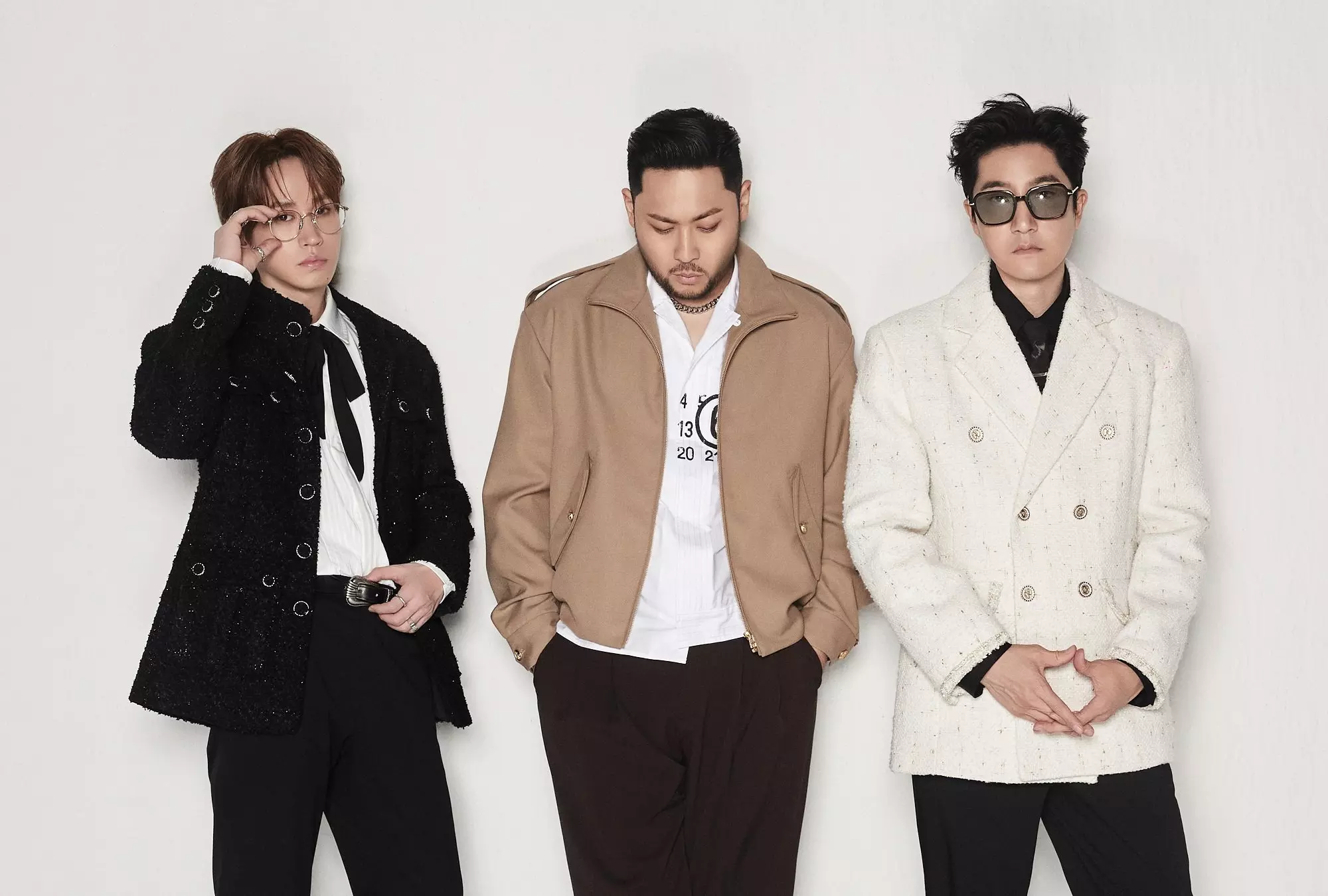
Epik High Are Still Pumped After All These Years: How The Korean Hip-Hop Trio Broke All Their Rules By Going Back To Basics
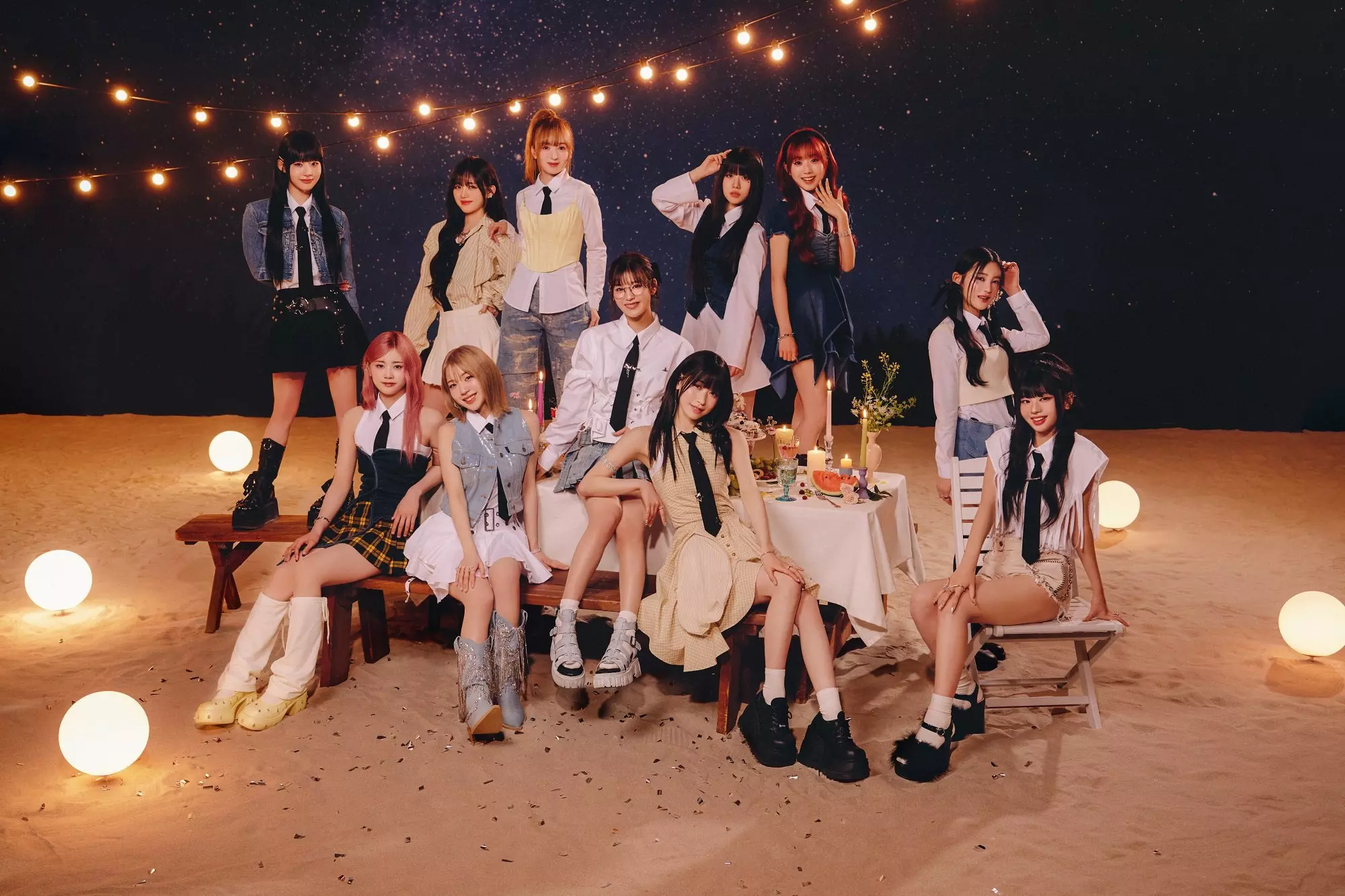
Meet ME:I, The J-Pop Group Who Want To Give The World A 'Hi-Five'
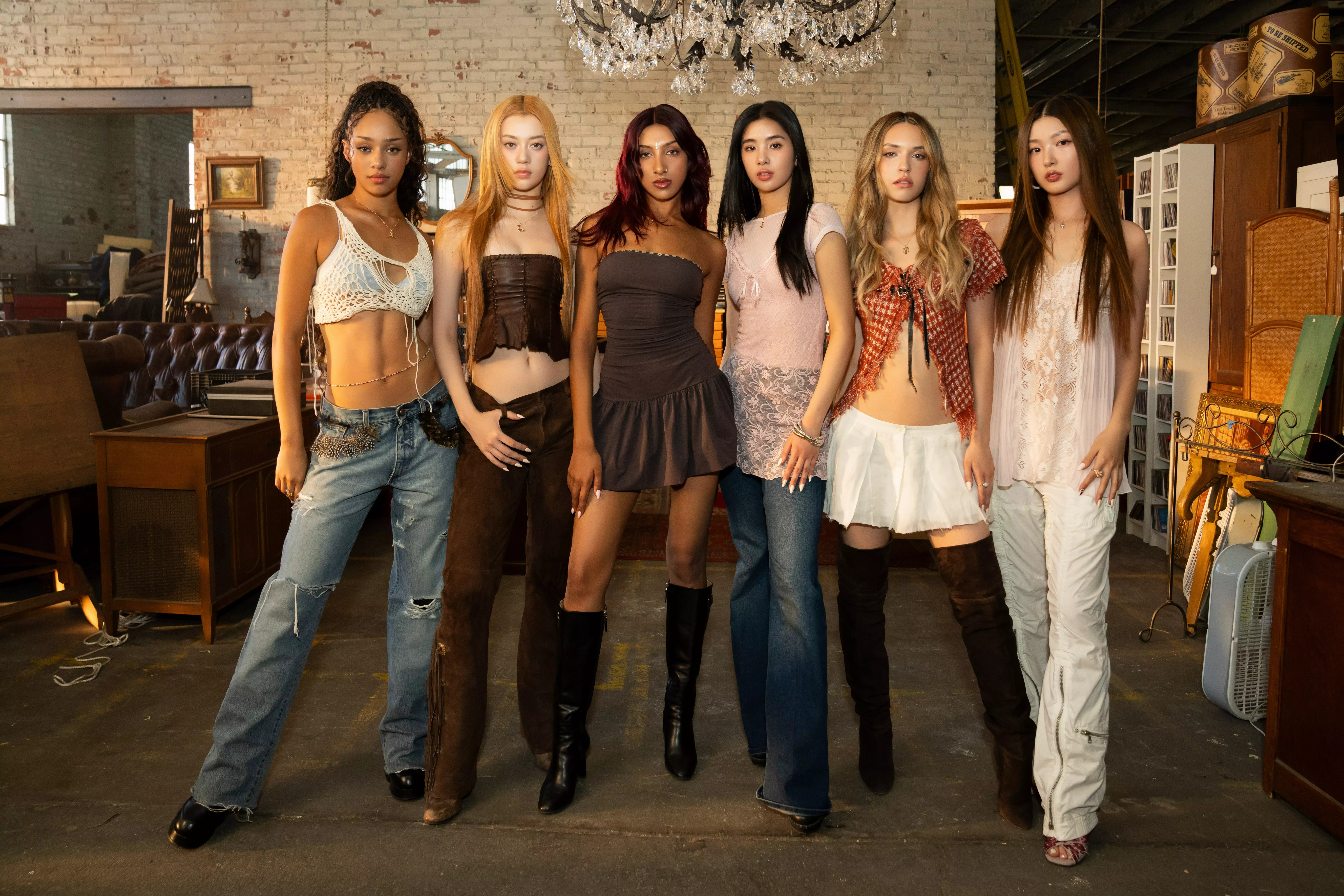
Get To Know KATSEYE: The Global Girl Group Styled After K-Pop Superstars
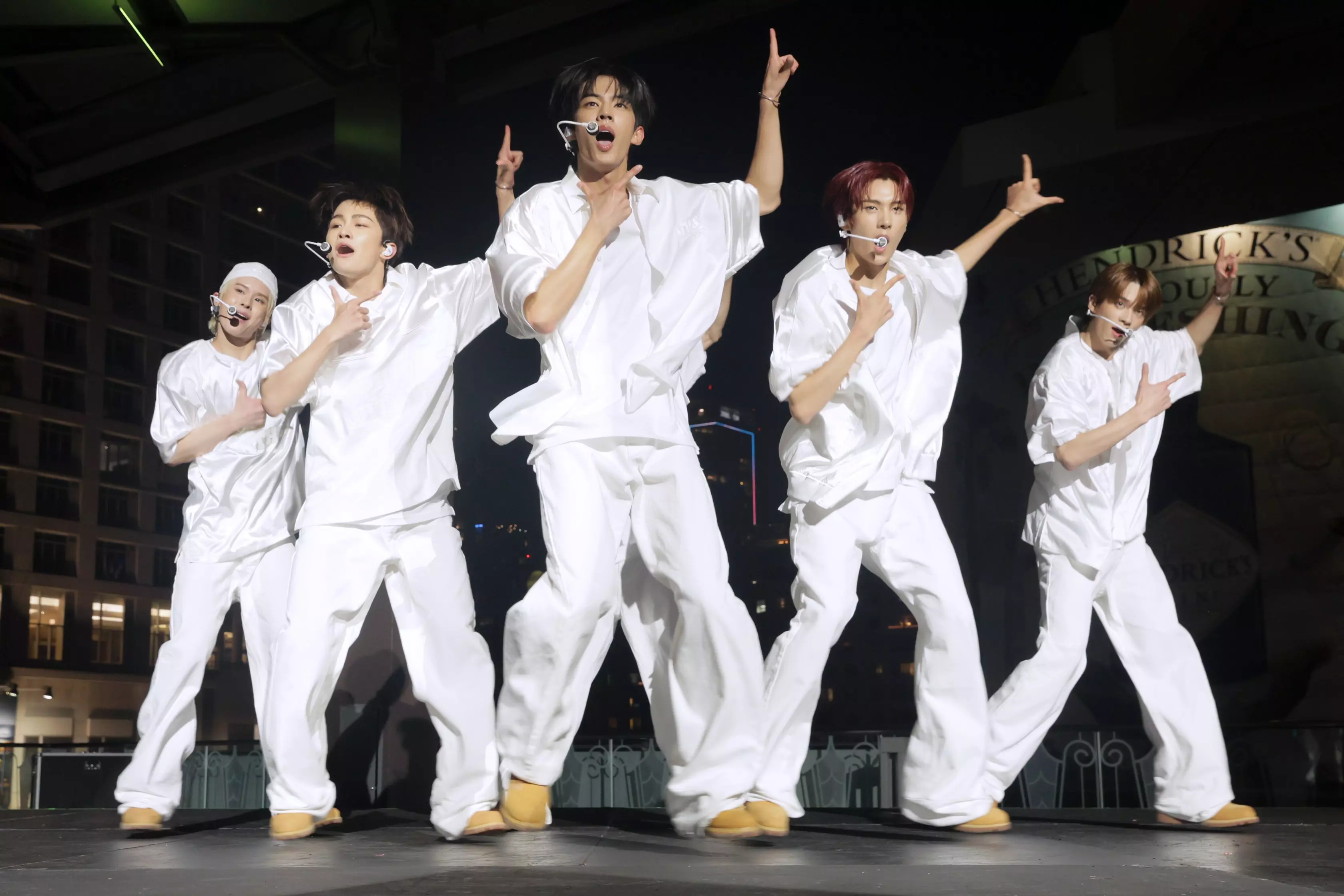
5 Takeaways From The GRAMMY Museum’s "HYBE: We Believe In Music" Exhibit
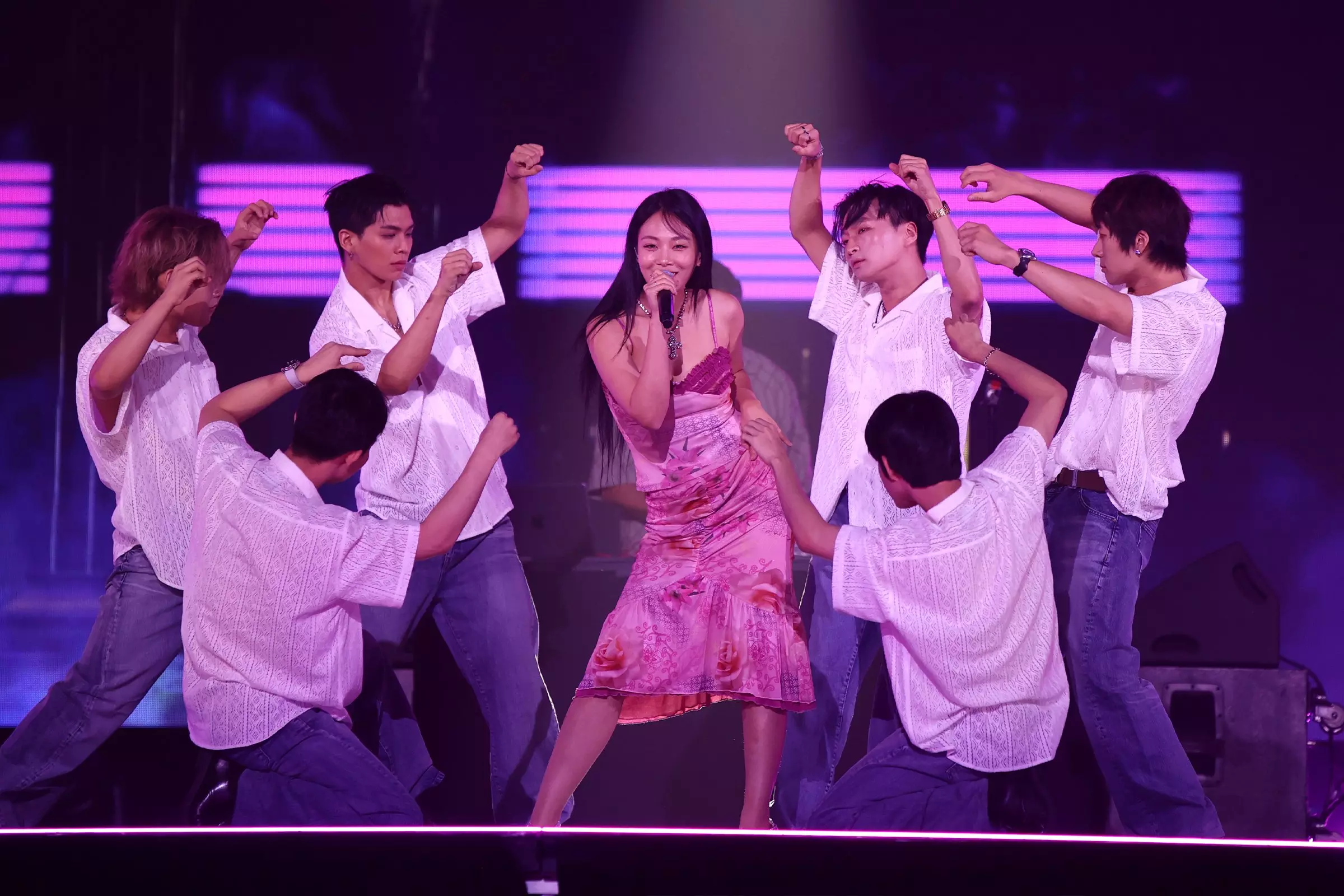
KCON L.A. 2024: 7 Highlights From NCT 127, ZEROBASEONE, NMIXX & More
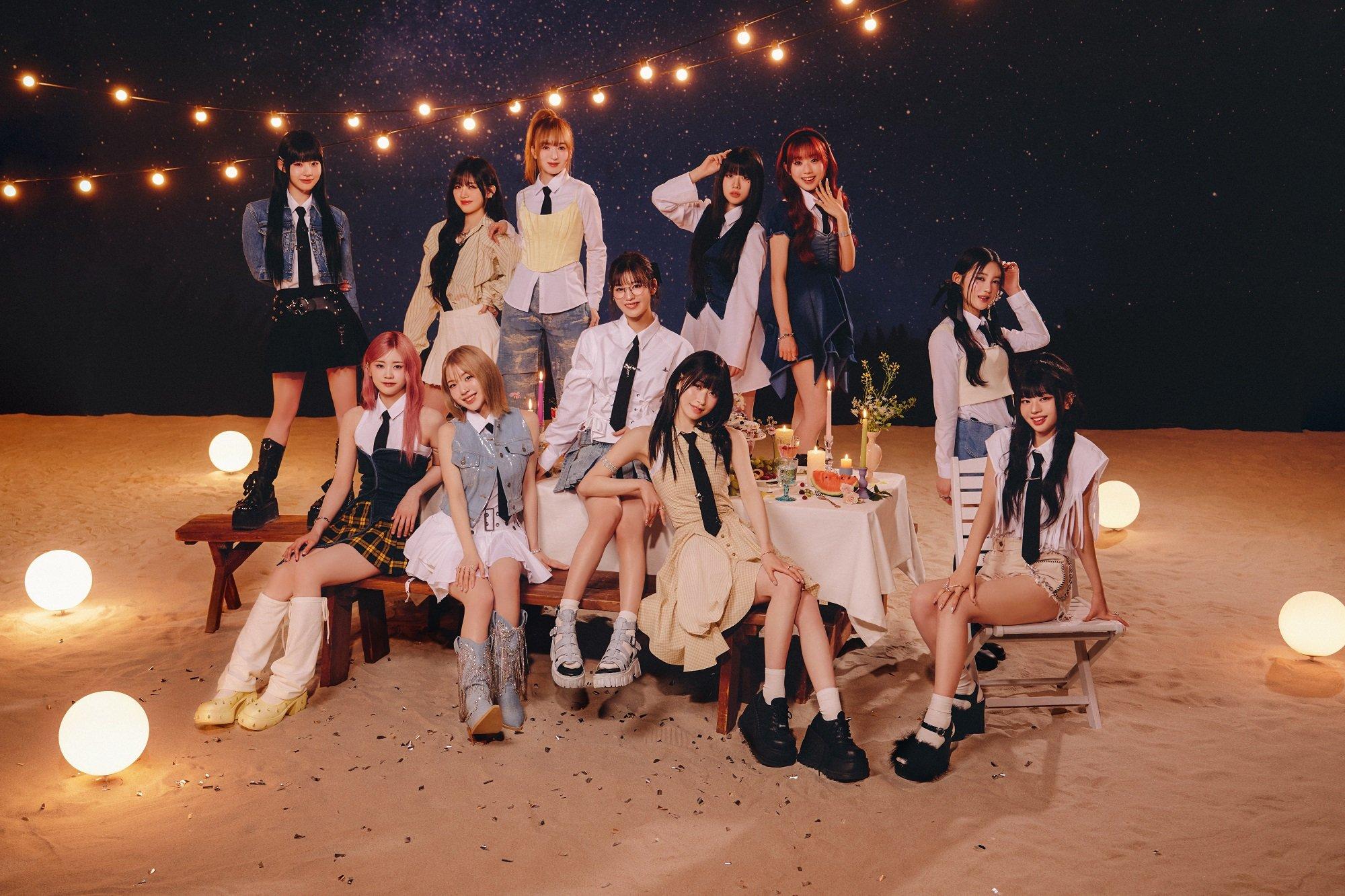
Photo courtesy of LAPONE GIRLS
interview
Meet ME:I, The J-Pop Group Who Want To Give The World A 'Hi-Five'
Ahead of their sophomore EP, 'Hi-Five,' members of ME:I discuss their new release, origin story and what's next for their collective colors.
When J-pop group ME:I debuted their balmy anthem "Hi-Five" at KCON L.A. 2024, their contagious energy captivated a stadium of fans and soon-to-be devotees. The song's euphoric vocal climax electrified the audience, asserting that "it's going to be a special season."
The 11-member group harnessed the spark of "Hi-Five" as they segued into "Click," the lead single off their debut EP, MIRAI. The magic of Momona, Rinon, Cocoro, Ran, Miu, Kokona, Shizuku, Ayane, Suzu, Keiko, and Tsuzumi (who is currently on a health-related hiatus) placed the audience at the Crypto.com Arena under a spell — their stage presence characterized by a vivid intensity and an endless allure.
But arriving at this moment involved traversing an arduous path. Before their debut, the 11 members appeared on the third season of "Produce 101 Japan" — the same survival show that previously brought boy groups JO1 and INI to life — and a global audience watched the trainees attempt to break into the music industry.
After overcoming the show's tests and hurdles, ME:I was born at the tail end of 2023, and MIRAI was unveiled in April. The record achieved remarkable success, reaching heights on the Billboard Japan and Oricon Charts with over 250,000 copies sold to date. Crucially, MIRAI showcased the group's artistic core, with music infused with a radiant temperament and complemented by intricate choreography.
Now, ME:I are building on that growth with their sophomore extended play, Hi-Five, out on Aug. 28. "This second [release] sounds much fresher, and since it's a summer concept, it feels very joyous," Cocoro tells GRAMMY.com over a video call from Tokyo. "It's definitely a step forward because…We are like a chameleon and can shift in different colors and forms as a group, so with Hi-Five, I think we've been able to expand our [artistry]."
ME:I are disarmingly genuine about their collective desire to keep growing while remaining down to earth about their success. "I want us to be role models and be a group where people can look at us and say, Okay, I want to do that one day and give them dreams," says Suzu.
Ahead of their EP release, ME:I detailed their journey so far, their experience at KCON, and how they're adjusting to their present while getting ready for tomorrow.
This interview has been edited and condensed.
How much does your present self differ from the artist you aspired to be before debuting? Perhaps your view of what it meant to be an idol has evolved since then, especially in light of your experiences during "Produce 101 Japan The Girls."
Cocoro: When I was in the audition process, I only had a vague idea of what kind of idol I wanted to be. However, when we formed ME:I and it [became a reality] that we were going to debut, that's when I realized there was a lot of attention and interest in our group — more than I expected. I felt that we were receiving love from not only people in Japan but also from around the world. Especially among the young people.
Momona: During my time at ["Produce 101 Japan The Girls"], I was able to meet a lot of people, I discovered new music, and I performed on different stages. I found that [those experiences were] quite different from what I originally imagined myself to become, and there wasn't any clear goal of what this team would be or a defined concept, so I was just focusing on whatever was in front of me during that process.
Our debut song, "Click," was something we didn't expect. It was a challenge for us because it was different from your typical K-pop, J-pop, or the "girl crush" movement that's happening right now. That song signifies that we are challengers and are here to bring a fresh breath of air into the industry. We are focusing on achieving the same or even more success with our new release.
Looking back, is there anything you would have done differently during "Produce 101 Japan The Girls"?
Miu: When we were in the middle of [the competition], we were in a very closed environment, rehearsing and trying to perform in teams. But, it was very difficult to find individual growth. I was only able to achieve that at the final performance of "Souzou Ijou," and now I feel I could have invested more in myself much earlier.
That was the first time I knew about how, as a performer, to reflect on yourself and see what you're missing. I didn't know how to find those places of improvement, but now I know how to learn, grow, and absorb from experience.
Shizuku: It was important for me to deliver the right performance, or what I consider the right performance. If I didn't reach that level, I would be very negative about myself. I was very focused on [doing] well and couldn't enjoy the performance on some stages. I paid too much attention to perfection, so now, looking back, I feel I should have enjoyed the music and the performance itself a little bit more.
At what instant did you grasp the new course of your life as members of ME:I?
Keiko: For me, it was when we performed as 11 at the Tokyo Girls Collection [fashion festival]. When the introduction video was shown and we stepped onto the stage, there was a huge light shining upon us. There was so much positivity. It felt like we were looking at the future, and I was really, really proud to be with these 11 girls on stage. In that spotlight, it felt like we could go anywhere together.
Rinon: I will never forget when they called out my name [in the final episode]. From there, we debuted, and we went to a lot of variety shows and did all of these photo shoots. I come from a smaller town [called Misaki-chō, located in the Okayama Prefecture], and I would hear that our fans visit [my hometown]. I would also hear the hairdresser say, "A fan of yours came to our hair salon and asked to have the same hairstyle as Rinon." These small stories of fans reacting and being so much into our work are the moments where I feel that I'm a part of this big thing.
How are you embracing all of these new experiences, and what is the biggest takeaway from all of them?
Ran: I have been in other groups because I was in the industry from a very young age. I feel that with ME:I, the volume of attention we are getting is very different from anything that I've done previously. I wasn't sure if I wanted to do the audition [for "Produce 101 Japan"] because I know how tough it is to make it in this industry. By having received a lot of love and support from the people around me with ME:I, I realized it's always important to challenge yourself to do something big.
It's a very positive experience, but we need to continue working hard and not waste this momentum we're having right now. We must do our best and grow as a group to meet people's expectations.
Suzu: There have been many changes in our lives, but what's important to me is to stay present and treasure every moment, regardless of the challenges we face. It's also important to be thankful, to appreciate the things around us, and to work hard. These are the things I keep in mind.
How are you striving to make the most of this chapter of your career and enjoy it to the fullest?
Kokona: When we first got together, there were some members I hadn't interacted with much during the audition, so I wasn't sure what was going to happen with this group. However, through all the work we have been doing, I got to know all of them, and now I can confidently say that I really enjoy what we do. There are obviously big challenges ahead, but I feel that all 11 of us can support each other.
Ayane: Even after our debut, we have been able to perform on big stages like KCON L.A. We also have these opportunities to meet our fans. Later this month, we have another concert happening, and for fans who are not usually able to see us, we can go to them and meet them. These opportunities are precious, so I hope we will do our best and give our all because we are in such a blessed environment.
The J-pop industry is quick-paced, and you're always on the move, so I want to ask how you try to incorporate self-care in this whirlwind.
Momona: The music and entertainment industry is very fast-paced, and every day, there's always someone new emerging, whether it's a group or an idol, so we want to make sure that we are ourselves and reflect that [authenticity] in our work. To do that, I think teamwork is key, and when you mention self-care, I believe it's the same thing.
We support each other as a team, making sure to take care of each other's mental well-being when needed. Even on our days off, we connect and go out together. We are a very close-knit group, and I think only we truly understand what we go through in our line of work.
KCON L.A. 2024 was the group's first official performance in the United States. How did you navigate the preparation phase, given that this would serve as your introduction to the world?
Ran: Leading up to KCON L.A., our schedule was really tight and we had our individual jobs as well, so it was hard for all of us to come together and rehearse properly. There was a bit of anticipation, and we might have been nervous, but the most important thing on stage was the energy we brought. So, whether practicing individually or as a group, we put in double the effort. I hope we were able to convey that passionate energy.
As for the show itself, it felt like many were seeing us for the first time, and what stood out to me was that the overseas audience seemed to be purely music fans. They love K-pop, but they also appreciate music in general, so you can tell that they were enjoying our performance, and that made us really, really happy.
And what was going through your mind in the moments before stepping onto the stage and the feelings afterward?
Ayane: We've experienced other stages, but the stage at KCON LA was something totally different. Even though it was their first time seeing us, [the audience was] truly enjoying the moment, and it was a very warm welcome.
But at the same time, it was very overwhelming too, and after we got off the stage, the adrenaline rush was something we'd never [felt] before, possibly due to the 360° stage setting. You were surrounded by the audience, and you could hear and feel their presence even more, so you had to really focus and deliver the best performance possible. Another thing different from Japan was that everybody had their smartphones out recording our performance. That also sort of brought up the focus under the notch, right? After everything was done, it was kind of a mixture of, you know, it's still being very nervous and exhausted, but we were able to cherish the moment.
Shizuku: It was also our first time performing our second single, "Hi-Five." So there was a lot of focus, and it was an important performance for us in that sense, too. When we went on stage, we thought, Okay, let's go out there and turn the audience into our fans.
**I’m glad that you brought up "Hi-Five," because this vibrant composition is a fitting continuation of your group's musicality. What significance does this new song and project hold in your career, and what do you hope to achieve during this era that you couldn't while promoting MIRAI?**
Miu: We learned many things from that experience [of releasing MIRAI], so [for Hi-Five], we made sure to discuss the performance aspect but also how we can improve as a team and further our teamwork. We ensured that our mindset going into the practices was aligned, and while we don't believe we have perfected it just yet, we feel that we are heading in the right direction. I think looking at some of the dance practice videos, we can see how much we've improved from "Click" and MIRAI.
Rinon: It’s our first summer song as a group so it’s very special, but it’s also a song where [listeners] can always celebrate summer with ME:I. We'll continue to put out music throughout our career, but each summer, we'll be able to look back and think of "Hi-Five" as our quintessential song for this season.
Living through summer means welcoming new beginnings and a celebration of joy, both of which "Hi-Five" captures perfectly. How do you think this reflects on ME:I's artistic identity?
Ran: When we recorded "Click," we didn't know what kind of group we were, and we weren't sure about the concept or the [creative] direction, but it was really well put together, with the dance breaks and the outfits we wore. I feel that, both visually and musically, "Hi-Five" captures the personalities of each member more than "Click." Even in the video, you could see different facial expressions and our personalities [captured] through our clothes. This song gives another new twist to ME:I.
What does it mean for you to know that people — not just your fans — can perceive and enjoy everything you create while on stage? And what’s the overall emotion you aim to convey through your music to create a lasting impact on listeners?
Keiko: We all have unique voices — that's what I love about this group because there aren't two members with the same voice. Especially when we harmonize, and I think that comes out very well in "Hi-Five." So, when we perform, the audience can enjoy our vocal colors, almost like a 3D sound system, and immerse themselves in that.
Kokona: We are a large group and I believe that's our strength in giving power to our performance, and the audience can perceive it. This comes out through not just the singing but also our choreography. We create big formations, and each of our moves [reflects] the essence of each member, so it transforms into this powerful energy we want to convey.**
Last month, ME:I celebrated 100 days since debuting. In a video commemorating this milestone, Momona said, "I think my love for the group grows, and I don't know what the future holds, but I hope it's a place I can have fun. ME:I will create the best place you can go." How are you pursuing the creation of this future? Are you envisioning it step-by-step or focusing on a long-term goal?
Momona: We do a lot of different jobs, but at the end of the day, we are artists and idols. Music is at the core of what we do as a group, and we should not forget that. We hope one day we can perform in a venue big enough to bring many fans and watch us, somewhere like a dome, perhaps. That's our long-term goal. We also want to have more and more songs so people who may not know us yet will get to do it and we want to make sure that our fans can enjoy them as well.**
Ultimately, we hope to become a group loved by many people and also have enough songs to perform a full concert. We will continue focusing on the musical side and aim to expand our discography.**
And what’s ME:I’s next dream?
All of them: We want to win the New Artist of Year Award at the Japan Record Awards! [Laughs.]
Miu: When we discussed our goals, we came up with participating in big television programs that we have here [in Japan] at the end of the year. We want to perform on those, or maybe we would like to go on a world tour. Personally, I would really like to come together with our pets, so we'll have a pet party as a group. [Laughs.] Also, it would be nice to visit someone's parents' house and hang out.
More J-Pop News

Meet ME:I, The J-Pop Group Who Want To Give The World A 'Hi-Five'
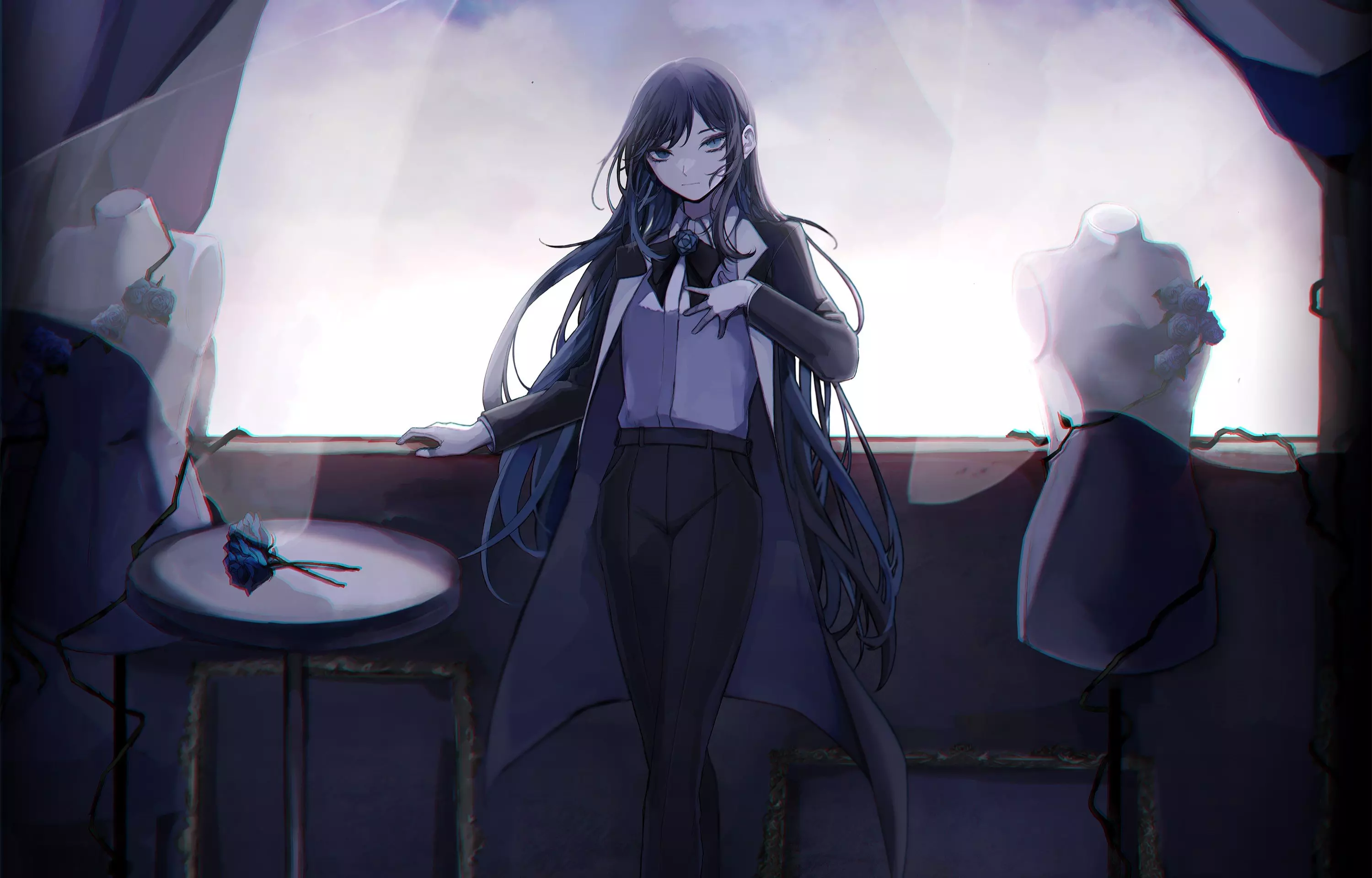
Get To Know Ado, The J-Pop Vocaloid Star Condemning Conformity
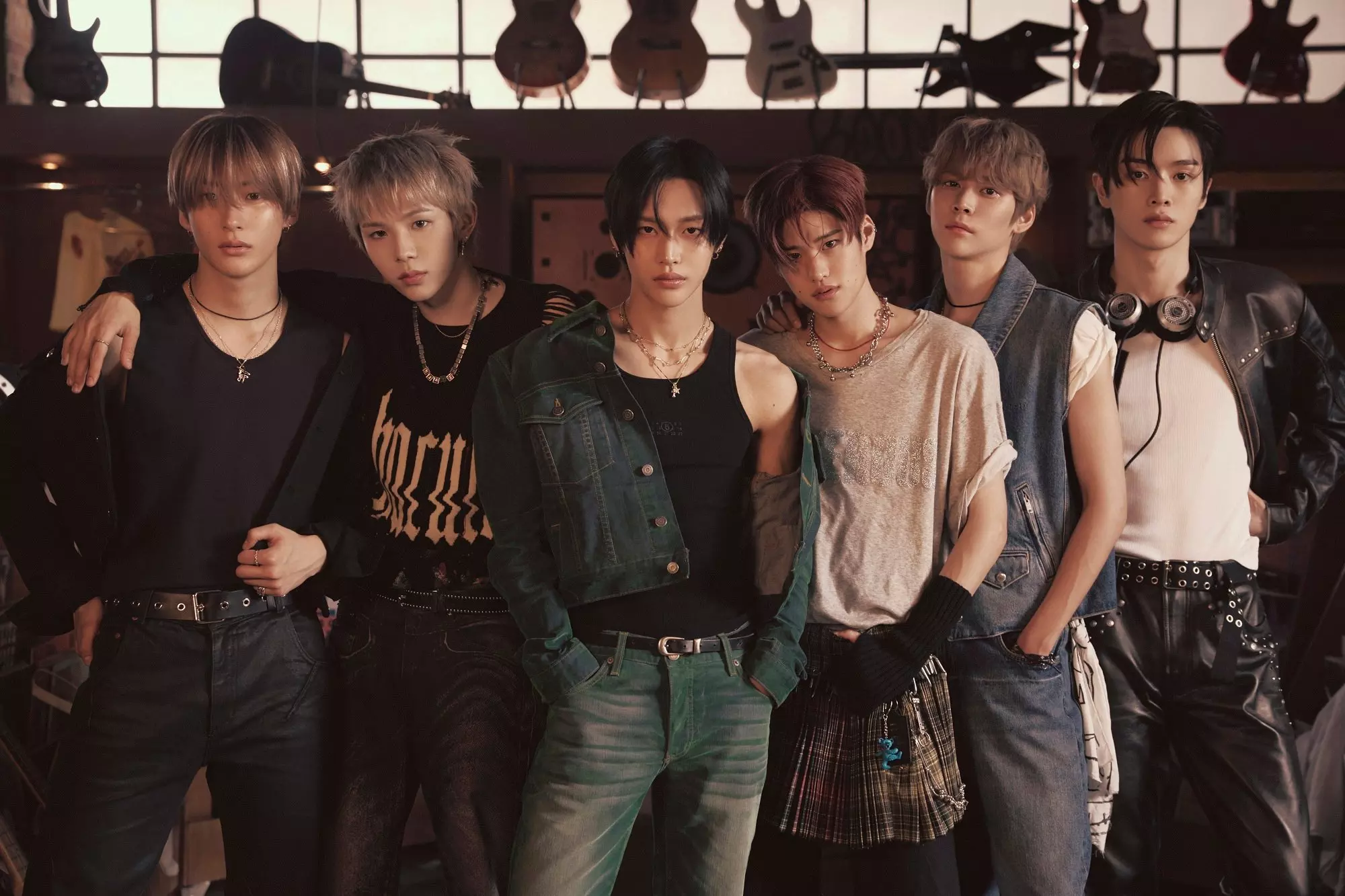
K-Pop Group RIIZE Detail Every Track On New Compilation 'RIIZING – The 1st Mini Album'
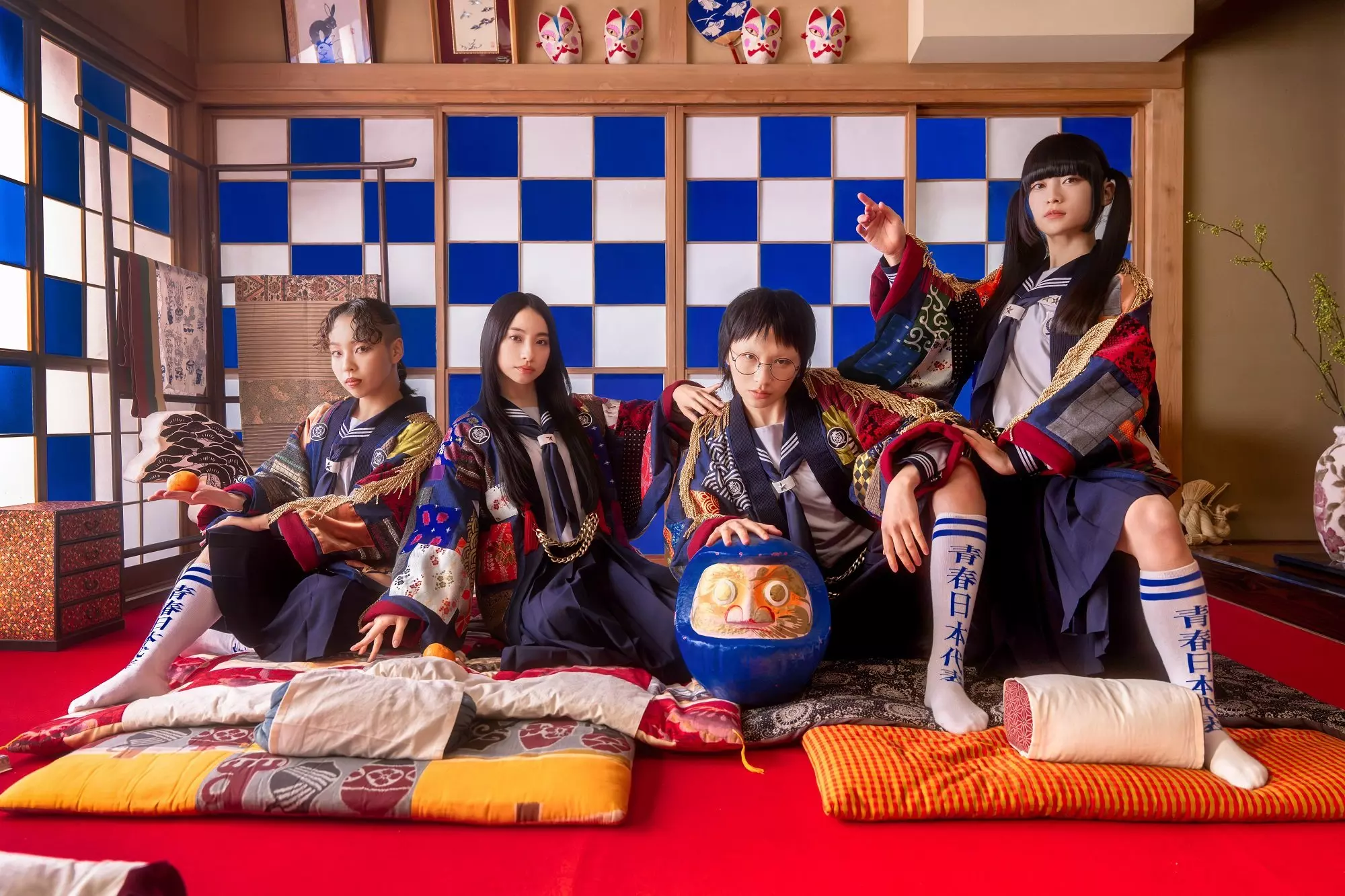
On 'AG! Calling,' Atarashii Gakko! Declare That Youth Is Never Lost — No Matter Your Age
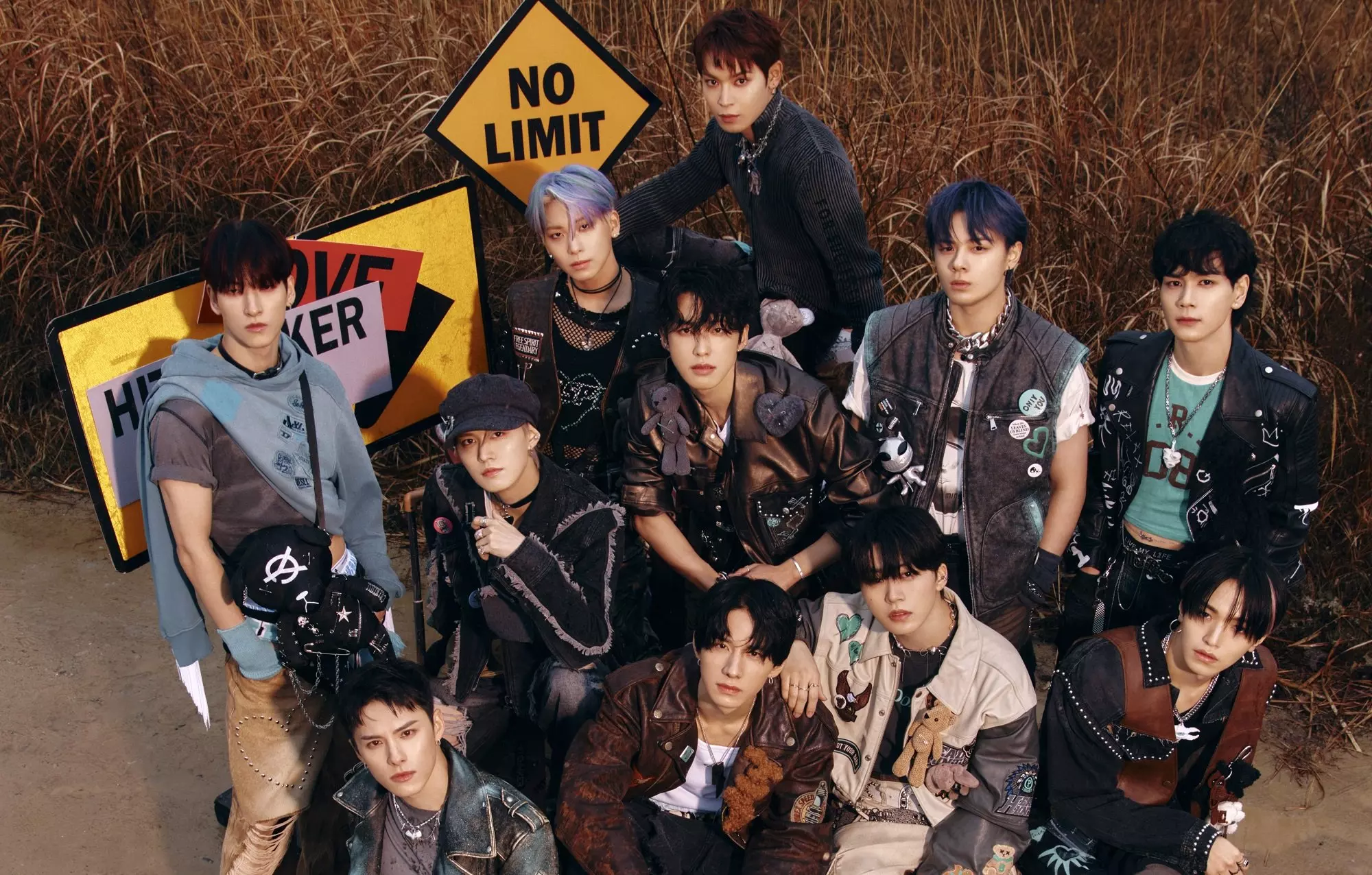
JO1's Big Year: Follow The J-Pop Group's Rise, From Their First U.S. Appearance To One Of Japan's Biggest Venues

Photo: ALERIE MACON / AFP via Getty Images
feature
How Sabrina Carpenter Became A Pop Queen: Tracing Her Journey To 'Short N' Sweet'
More than a decade in the making, Sabrina Carpenter is living out her superstar dreams. As she releases her new album, 'Short n' Sweet,' look back on the chart-topping star's journey and how every venture helped her evolve into a pop phenom.
Sabrina Carpenter is the first to admit that it's taken her a bit of time to find her way to the top of the music industry. She even likens herself to the tortoise in the fable "The Tortoise and the Hare" — even if she didn't want to believe the metaphor growing up.
"Something that my mom always said to me as a little girl that really annoyed me was that I am the tortoise… throughout my life, [I was] being told, 'Sabrina, you're the tortoise, just chill,'" Carpenter recalled while accepting the Variety Hitmakers Rising Artist Award in December 2023. "In moments of frustration and confusion it can feel like a letdown, but it turns out it's actually a very good thing."
It's been a very good thing for Carpenter, indeed. A decade since the release of her debut single, the singer/songwriter isn't just breaking through — she's one of pop's new reigning queens. Over the last year, Carpenter has nabbed her first No. 1 song on the Billboard Hot 100, made a stellar debut at Coachella, and performed on "Saturday Night Live," all the while racking up billions of streams on her music new and old. It's all built excitement for one of the most anticipated pop albums of the summer: Short n' Sweet.
As Carpenter unveils her new album, take a deep dive into her decade-long journey to pop stardom.
Getting Started: Disney Breakthrough
Growing up, Carpenter filled the sounds of her family home in Pennsylvania with covers of songs like Adele's "Set Fire To The Rain" and "Picture to Burn" by future Eras Tour companion Taylor Swift (more on that later). After submitting videos for a singing contest spearheaded by Miley Cyrus, Carpenter would get her first taste of success. Placing third, she caught the eye of Hollywood Records, who signed her following the competition.
Simultaneously, Carpenter also began pursuing acting, landing guest spots on series like "Law & Order: Special Victims Unit" in 2011 and joining "The Goodwin Games" in 2012. In 2014, she landed a lead role in the Disney Channel series "Girl Meets World," a spin-off of the beloved '90s series "Boy Meets World," which served as a breakthrough moment for the burgeoning star — and a catalyst for her music career.
Just before the show debuted, Carpenter released her debut single, "Can't Blame A Girl for Trying," the title track to her debut EP that arrived a month later. While the four-track EP was the typical output of a teenage Disney star — bubblegum pop sounds with digestible, family-friendly lyricism — it showed off her youthful timbre and offered themes that would become prevalent later in Carpenter's songwriting: love, heartache, and navigating life.
A year later, she released her debut album, Eyes Wide Open. A mix of pop with folk and country influences — a soundscape that remains on Short n' Sweet — Carpenter's debut showed maturity and growth following Can't Blame A Girl For Trying; songs like "Eyes Wide Open" and "We'll Be the Stars" showed a more introspective side, reflecting on the pressures of being in the spotlight and the journey of finding her identity. Eyes Wide Open also hinted that Carpenter was beginning to hone her songwriting skills, penning four of the 12 tracks.
It would be on her 2016 sophomore album, EVOLution, where Carpenter would find confidence as a songwriter, co-writing all but one song on the 10-track project. In turn, the lyrics reflected her growing sense of self and a new perspective on past themes, like embracing non-romantic forms of love in "All We Have is Love," being there for a struggling friend in "Shadows," and learning to assert boundaries in "Space."
EVOLution transitioned Carpenter out of the teen pop aesthetic into a more sophisticated sound, experimenting with dance-pop and techno sonics. Genre versatility would become a throughline of sorts for Carpenter, and EVOLution foreshadowed the multifaceted musicality that was to come.
Shedding Disney: From Child Actor To Pop Star
After "Girl Meets World" came to an end at the beginning of 2017, Carpenter was ready for reinvention. Much like Britney Spears' Britney and Cyrus' Can't Be Tamed before her, as Carpenter grew into an adult, she felt like she needed to shed the Disney-fied image that has become a rite of passage for teen stars. Thus began the Singular era.
Released in 2018 and 2019, respectively, Singular: Act I and Singular: Act II featured songs that were more risqué and mature in nature. A far cry from her tamer work of the past, the R&B track "Hold Tight" is equal parts sultry and evocative with Carpenter singing, "Wanna keep you in, wanna keep you in right/ Wanna feel your skin, wanna feel it on mine."
As she noted in an interview with Billboard, Singular: Act I was a natural progression for a girl now in her late teens — even if it was against the squeaky-clean image of her beginnings.
"I was known as a fictional character on television with lines that were written for her with an attitude that was portrayed in a way by other people. So for a lot of people, their first impression of me was as a 13-year-old girl [singing] the kinds of songs that she should be singing," she said. "Then, flash forward to 19, and people are asking why I am not singing about the same things that I did when I was 13, as if that's normal."
One of the more notable Singular tracks is from Act I, "Sue Me." Sneakily disguised as a story about a romantic relationship, the song is Carpenter's response to being sued by her ex music managers: "That's my shape, I made the shadow/ That's my name, don't wear it out though/ Feelin' myself can't be illegal." Its tongue-in-cheek and snarky nature would inevitably embolden Carpenter to continue writing more confessional songs with attitude, whether she's responding to media scrutiny in "because i liked a boy" from 2022's emails i can't send, or warning a suitor to be careful in Short n' Sweet's "Please, Please, Please."
Singular: Act I and Act II further helped demonstrate different facets of Carpenter's musicality, with the former leaning into pop tendencies and the latter embracing an R&B flair. And as her final albums with Hollywood Records, she used Singular: Act I and Act II to indicate that she wasn't going to let any sort of previous perceptions hold her back. Their coming-of-age themes showcased Carpenter as an artist coming into her own — regardless of whether listeners wanted to keep her in the Disney box or not.
Reintroducing Herself: Artistic Authenticity & The "Nonsense" Effect
While the world was going through a period of change amid the COVID-19 pandemic, so was Carpenter. She signed with Universal Music Group's Island Records in 2021, and soon she would be able to fully introduce the world to who Sabrina Carpenter is as an artist.
As she noted herself to Variety earlier this year, her 2022 LP, emails i can't send, "marked the beginning of a really freeing and artistic time for me." Once again, she co-wrote every song on the album; this time, though, she only had one co-writer for each track, and even wrote two songs solo ("emails i can't send" and "how many things") — proving that she was more assured as a songwriter than ever.
As a result, Carpenter's knack for confessional songwriting is on full display. emails i can't send represents a reflective time capsule of sorts; one that brings the curiosity of her earlier work with the perspective and wisdom of a young adult. Her growing fame meant there was more attention on her personal life, and emails i can't send allowed her to reclaim her narrative and express her side of the story.
Carpenter's candidness struck a chord with listeners, and upon the release of emails i can't send in July 2022, it was clear Carpenter was on a new trajectory. The album debuted at No. 23 on the Billboard 200, which marked her highest entry on the chart to date (as of press time); the 2022 stretch of her Emails I Can't Send Tour sold out in less than a day. And once "Nonsense" was released as a single that November, her place as a rapidly rising star was solidified.
"Nonsense" was initially written as a means to an end after Carpenter was writing a sad song and had writer's block. Now, the track is the epitome of Carpenter's lyricism, weaving together her wit and humor with an infectious hook. First gaining traction on TikTok because of its catchiness, it's become a beloved part of Carpenter's canon thanks to her inventive and bespoke outros during her live shows. It's since become a tradition for fans to check to see what outro she created for each performance, adding to the fan fervor.
Carpenter further satiated fans' taste for her cheeky lyricism in March 2023, when she released emails i can't send fwd:, the deluxe version of her album, which featured a new track called "Feather." She took the playful, flirting energy of "Nonsense" and infused "Feather" with buoyant, airy production that mimics the feeling of self-liberation after moving on from a relationship. Earning Carpenter her first pop radio No. 1, "Feather" proved that the singer's audacious style was taking hold — and it set the stage for an even bigger 2024.
Becoming A Superstar: Eras Tour, "Espresso" & Beyond
After her own extensive — and very sold out — tour in support of Emails I Can't Send, Carpenter's rising star status was further confirmed by pop's current queen, Taylor Swift. The singer earned a coveted opening slot on Swift's monumental Eras Tour in Mexico, South America, Australia, and Asia.
Just after her last Eras Tour show in March 2024, Carpenter hinted that her own new era was beginning. "I'm starting to feel like I've outgrown the songs I'm singing," she admitted to Cosmopolitan, "which is always an exciting feeling because I think that means the next chapter is right around the corner."
That chapter began with "Espresso," which dropped a day before her debut Coachella performance. Doubling down on the playful, self-assured vibe of "Nonsense," the song immediately hinted that big things were coming for Carpenter, debuting at No. 7 on the Billboard Hot 100, where it peaked at No. 3.
Upon announcing her sixth album, Short n' Sweet, Carpenter released "Please Please Please." Combining her now-signature playful, carefree lyricism with an airy, disco-tinged sound, "Please Please Please" didn't just present Carpenter as a confident superstar — it became her first Hot 100-topping smash.
Carpenter has referred to Short n' Sweet as the "hot older sister" of emails i can't send. "It's my second 'big girl' album; it's a companion but it's not the same," she explained to Variety, to whom she also admitted she feels a "sense of separation" from her work prior to emails. "When it comes to having full creative control and being a full-fledged adult, I would consider this a sophomore album."
It's apt, then, that her Short n' Sweet collaborators — including songwriters Julia Michaels, Amy Allen and Steph Jones — are largely the same as the team from emails i can't send. "I've really honed in on the people that I love making music with," she told Rolling Stone in June.
Even more telling of the direction she's heading is her work with one of pop's hottest producers — and Swift's right-hand man — Jack Antonoff, for the first time. At a GRAMMY Museum event with Antonoff himself, Carpenter debuted the country-infused "Slim Pickins," presenting yet another pop style from Short n' Sweet. And as "Slim Pickins," "Espresso" and "Please Please Please" indicate, Carpenter's knack for infectious and edgy lyrics isn't just the throughline across Short n' Sweet — it's become the epitome of both her artistry and her stardom.
Just like her metaphorical friend the tortoise, Carpenter's long but steady journey has clearly paid off. As she's figured out who she is on her own terms, she's manifested the bonafide superstardom she's always imagined.
"I never had the plan B, and it wasn't even a thought in my mind that it wouldn't work out," she told Rolling Stone. "I just always knew it was about not if it would happen but when it would happen."
For Carpenter, every chapter of her artistry has built on the last; she's refused to rest on her laurels and continuously pursued new directions. She's creating work that wholeheartedly reflects her, and growing a loyal fan base because of it. Her next album might be named Short n' Sweet, but her time as a pop superstar will be anything but.
All Things Sabrina Carpenter

How Sabrina Carpenter Became A Pop Queen: Tracing Her Journey To 'Short N' Sweet'

13 Must-Hear Albums In August 2024: Sabrina Carpenter, Post Malone, A$AP Rocky & More

Meet Amy Allen, The Hitmaking Singer/Songwriter Behind Sabrina Carpenter's "Please Please Please" & More Pop Gems
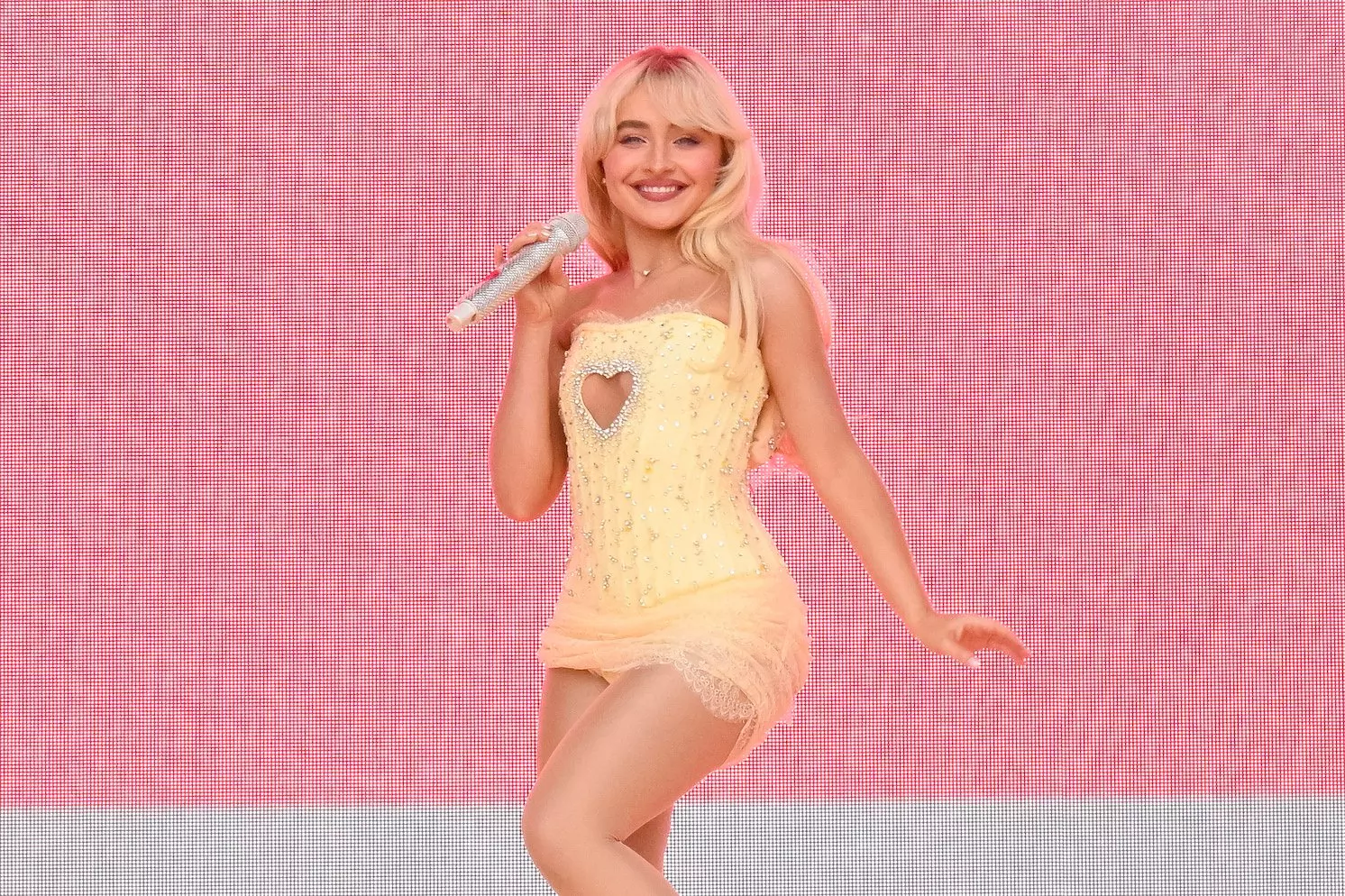
9 New Pride Anthems For 2024: Sabrina Carpenter's "Espresso," Chappell Roan's "Casual" & More
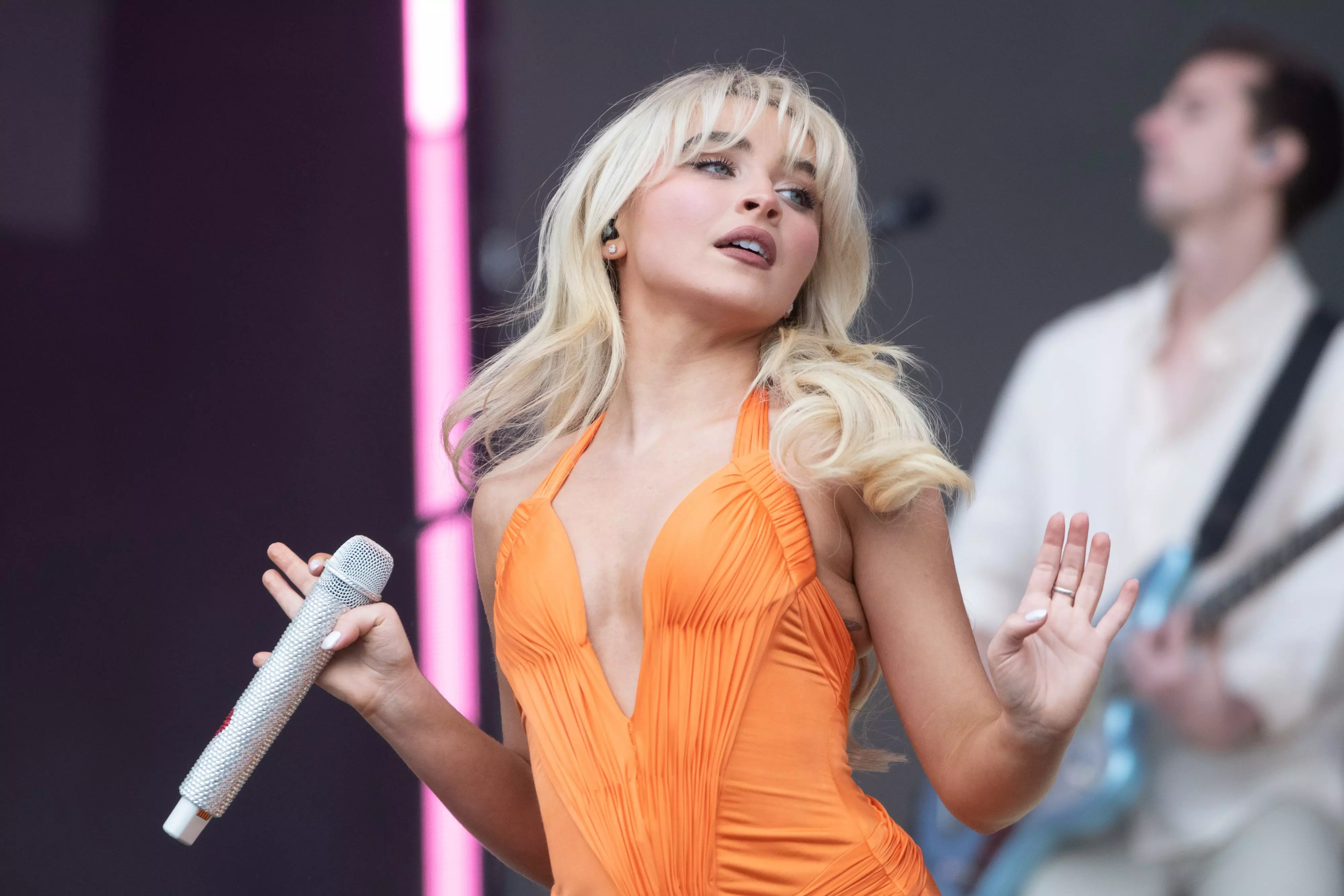
Sabrina Carpenter Releases New Single "Please Please Please": Everything We Know About Her New Album 'Short N' Sweet'
